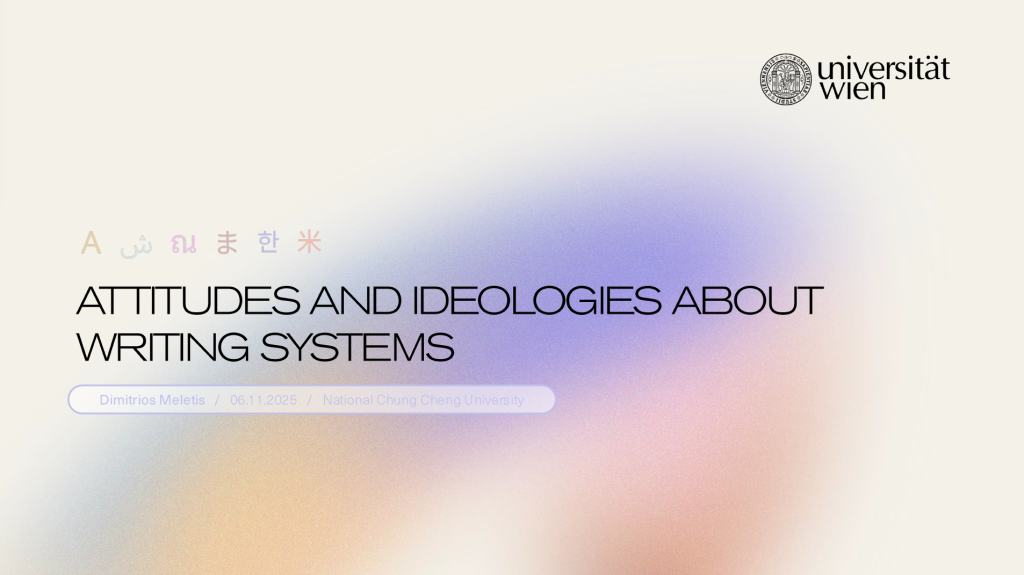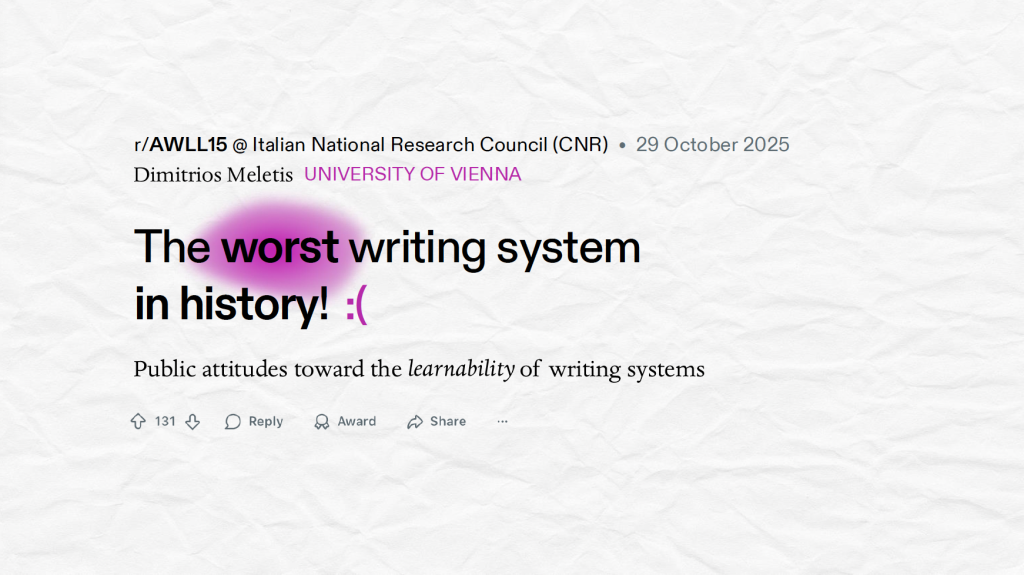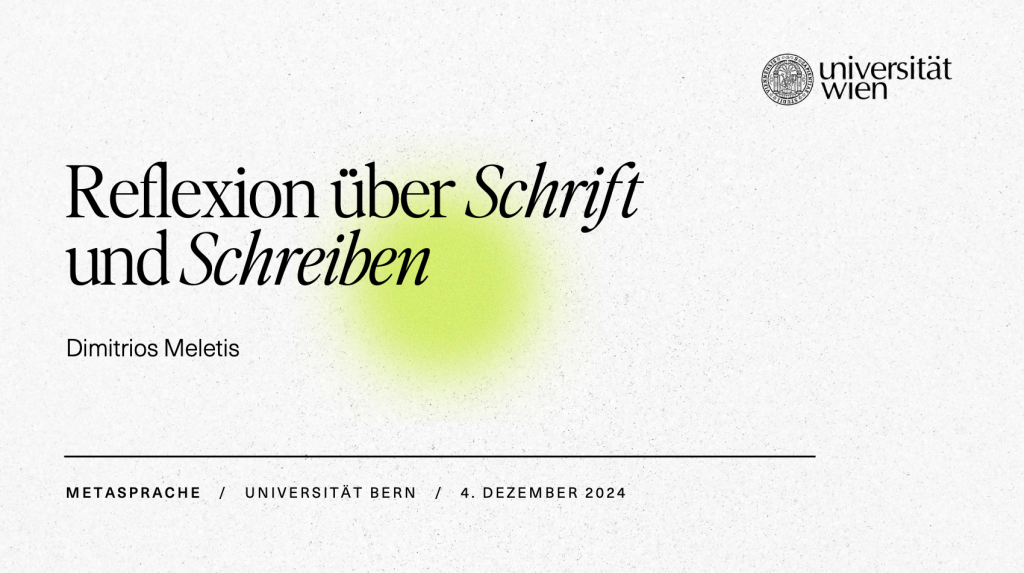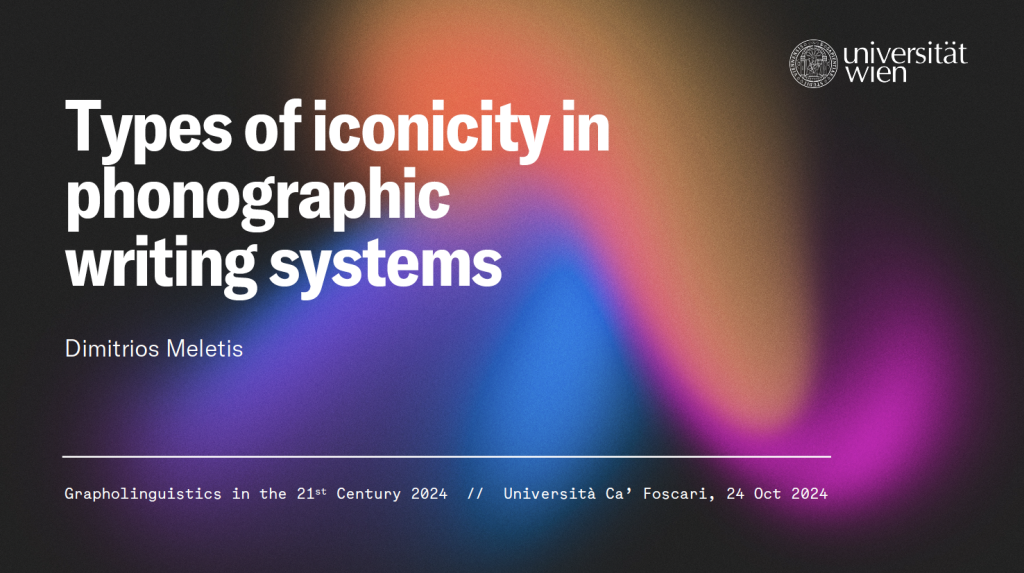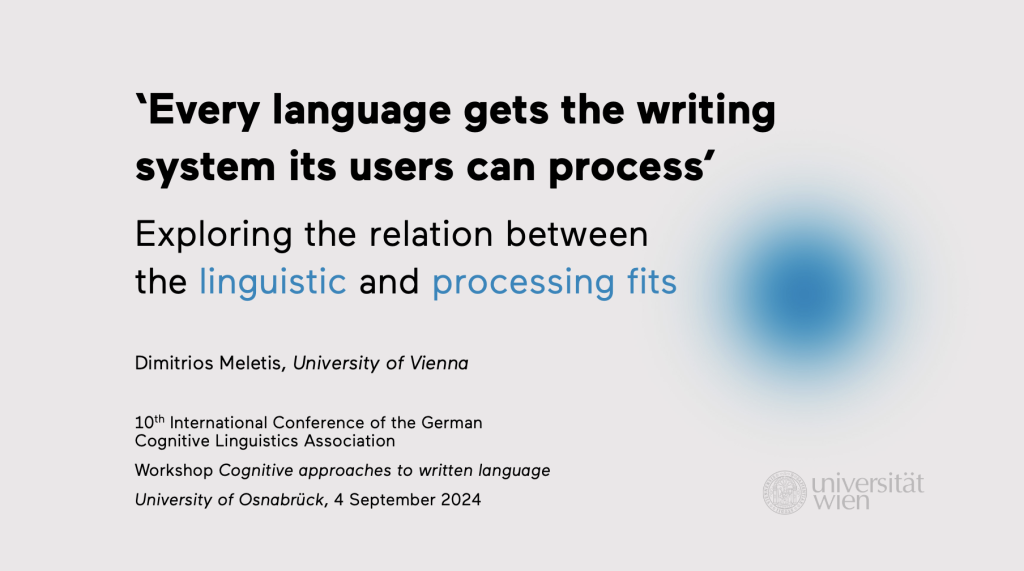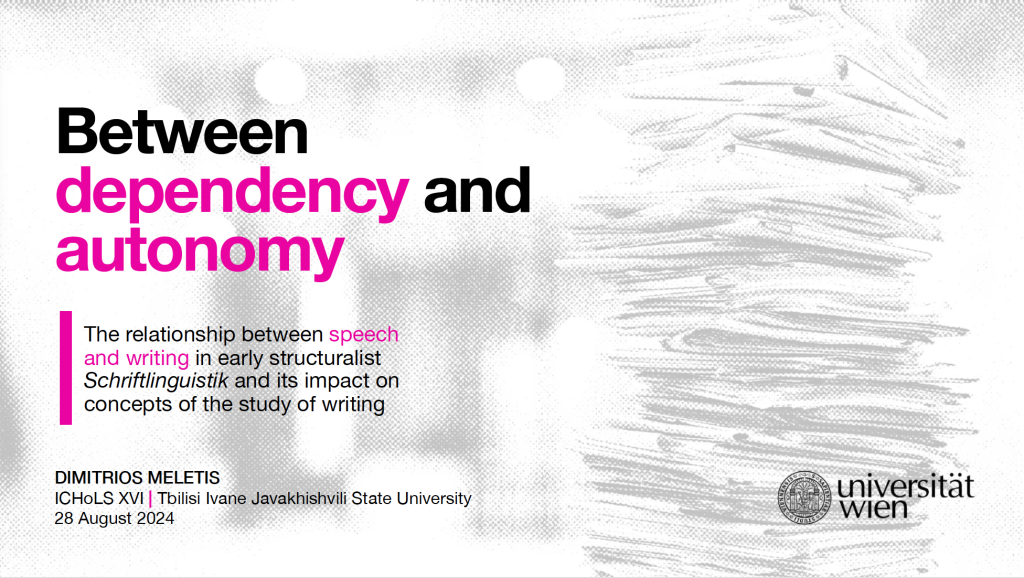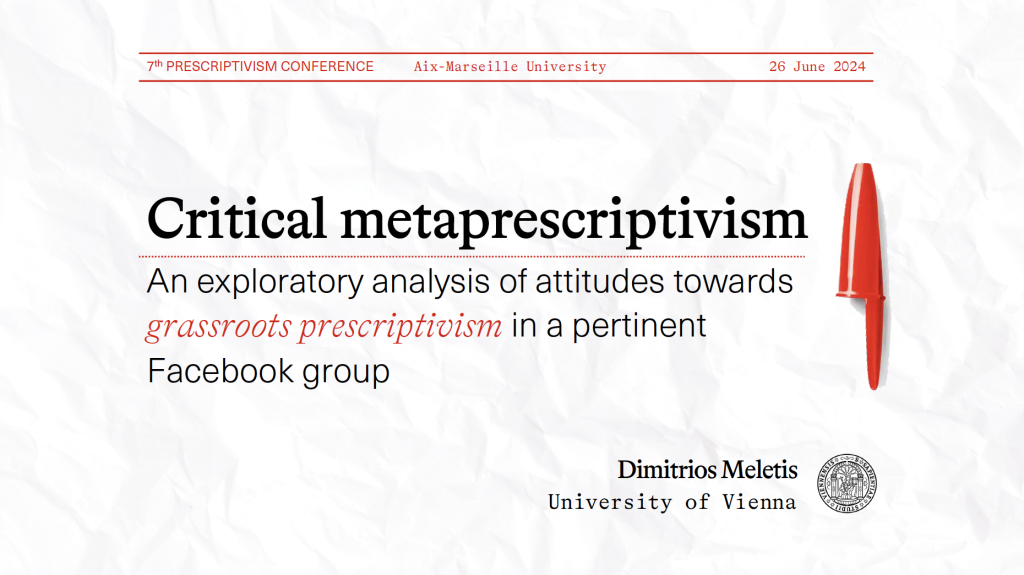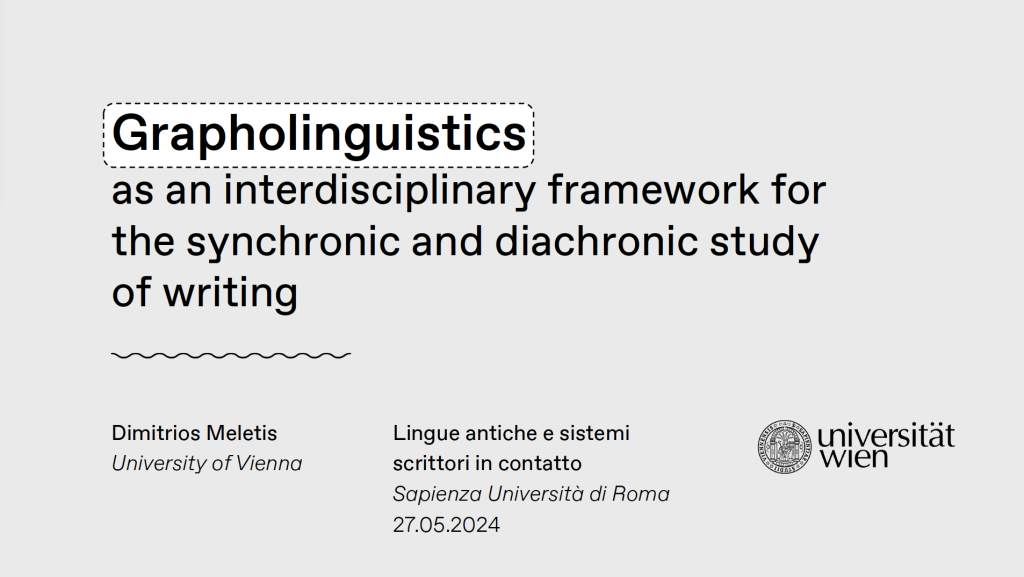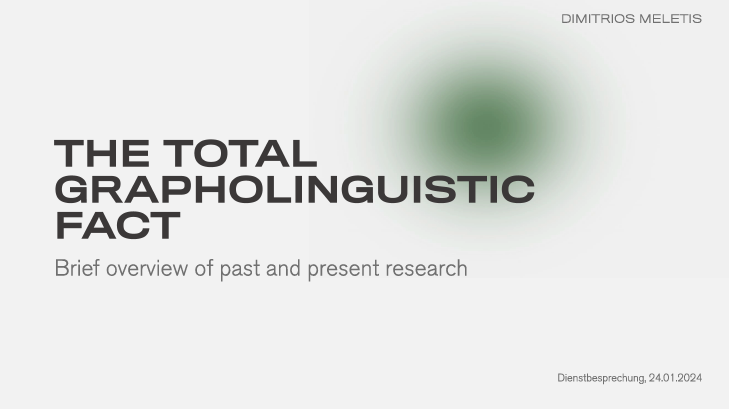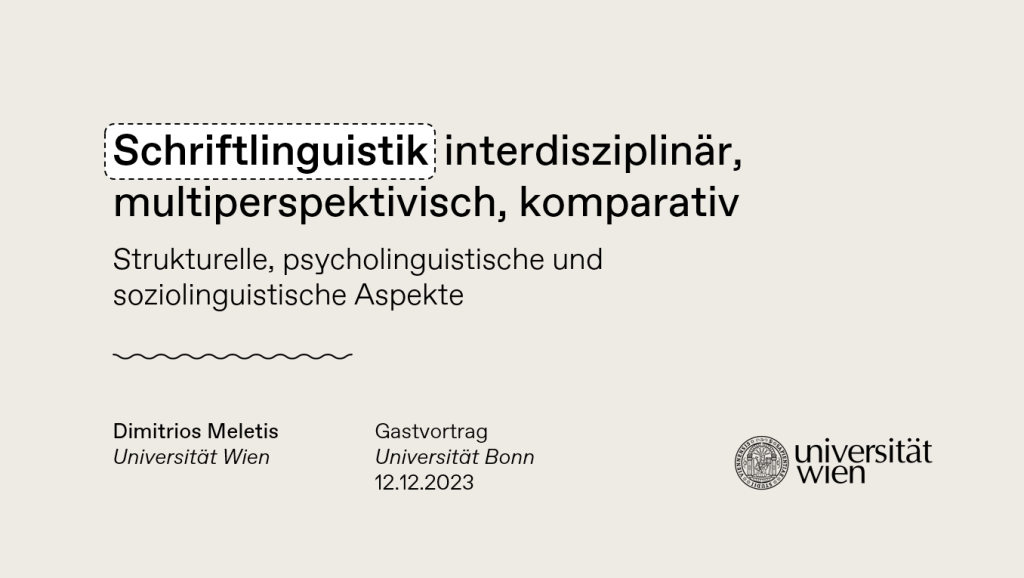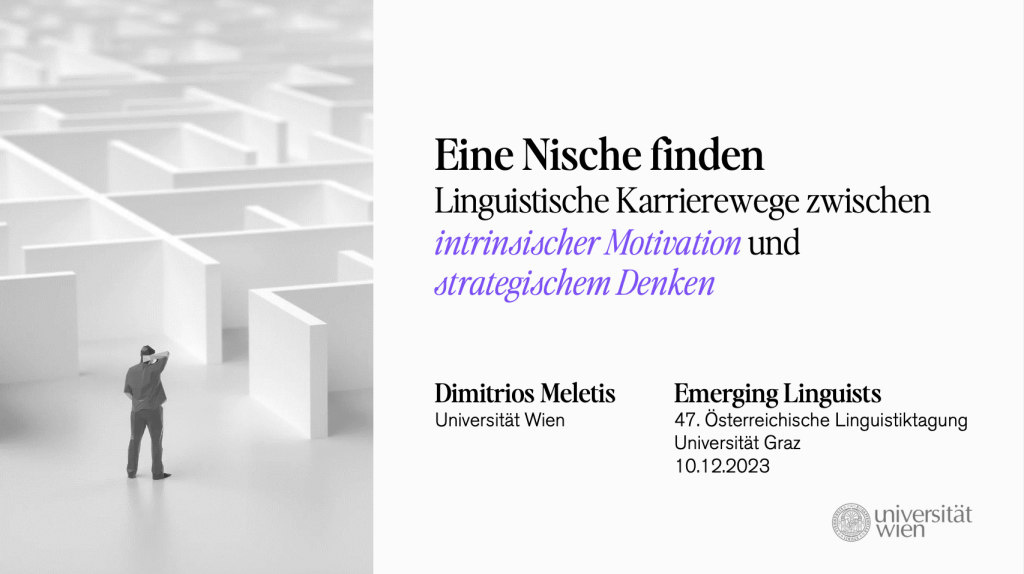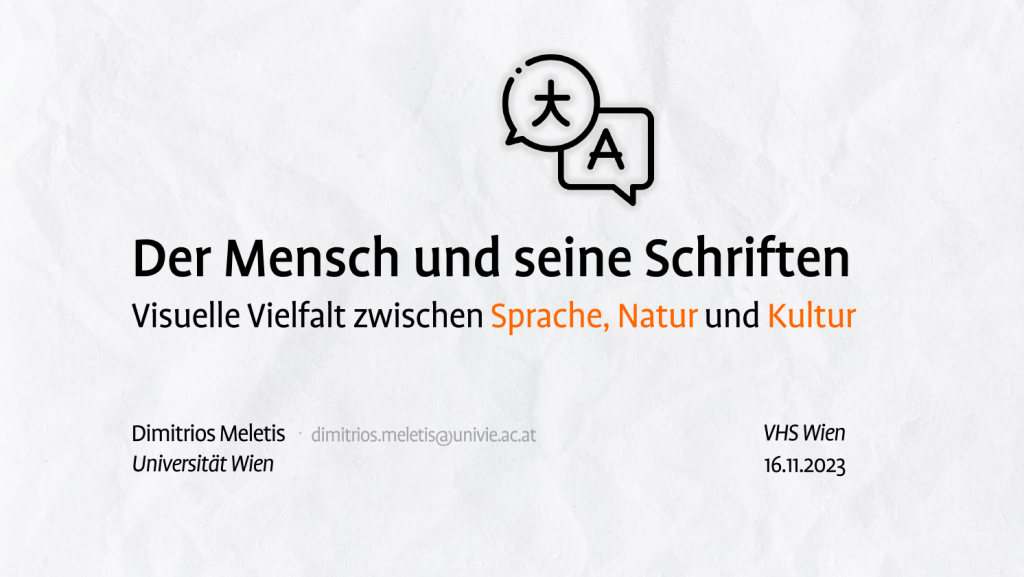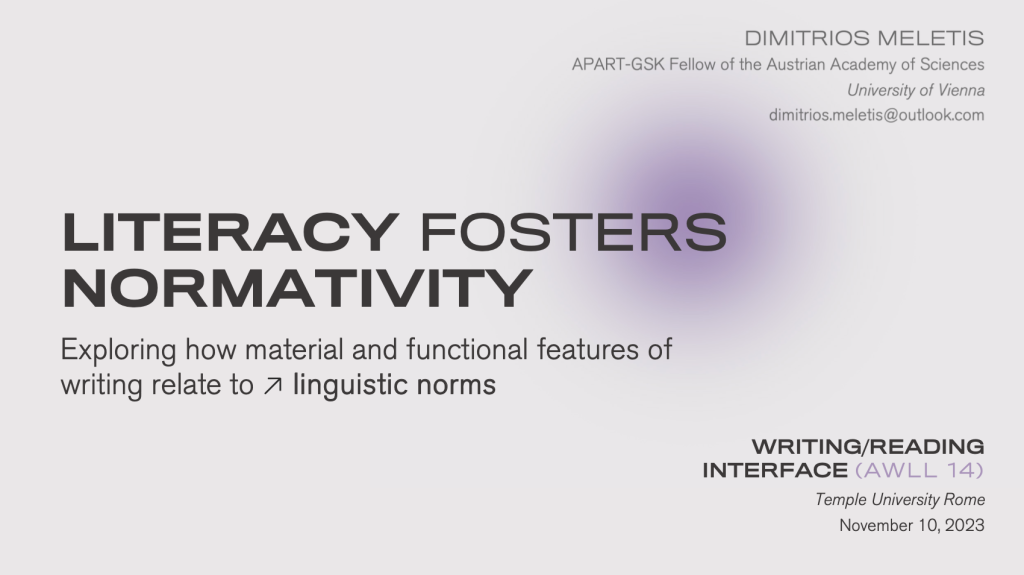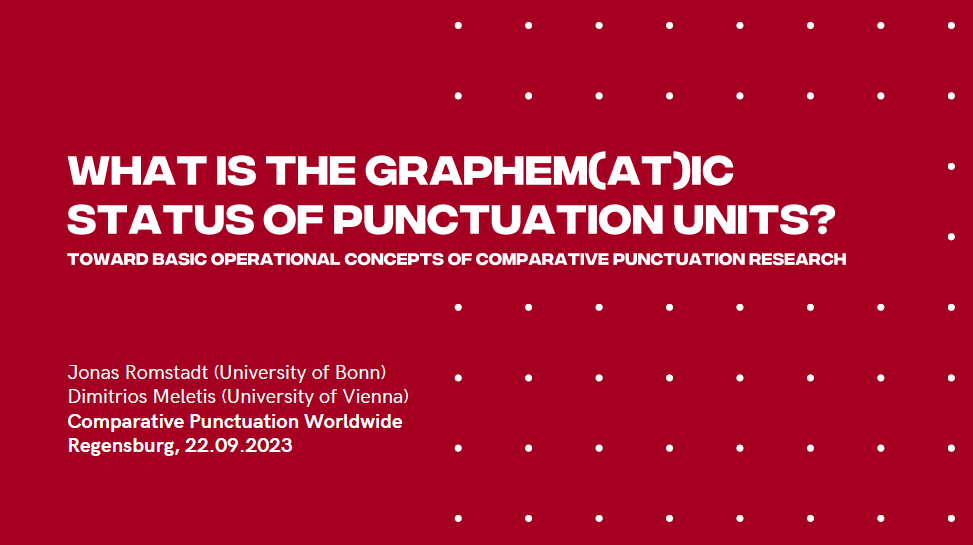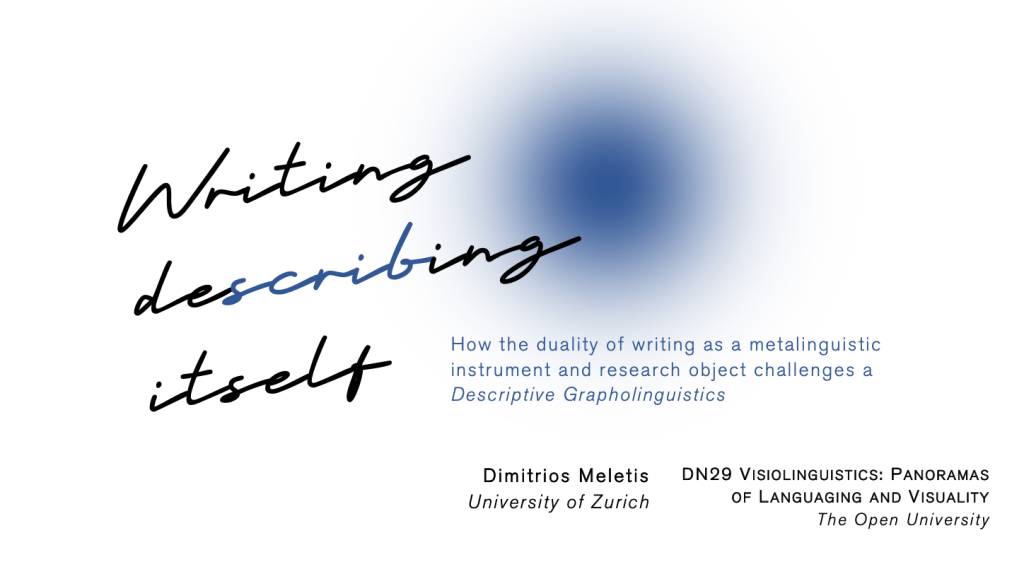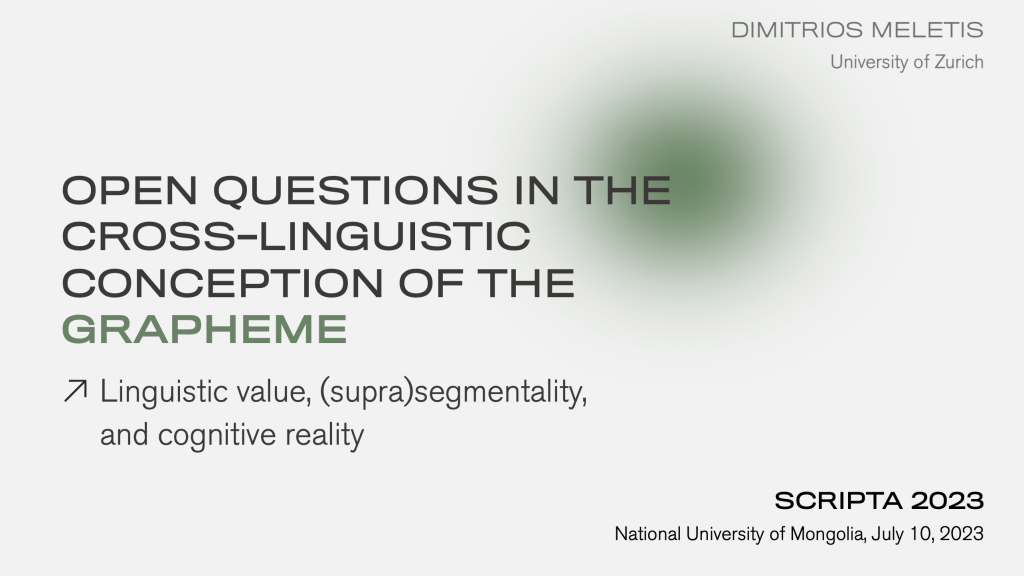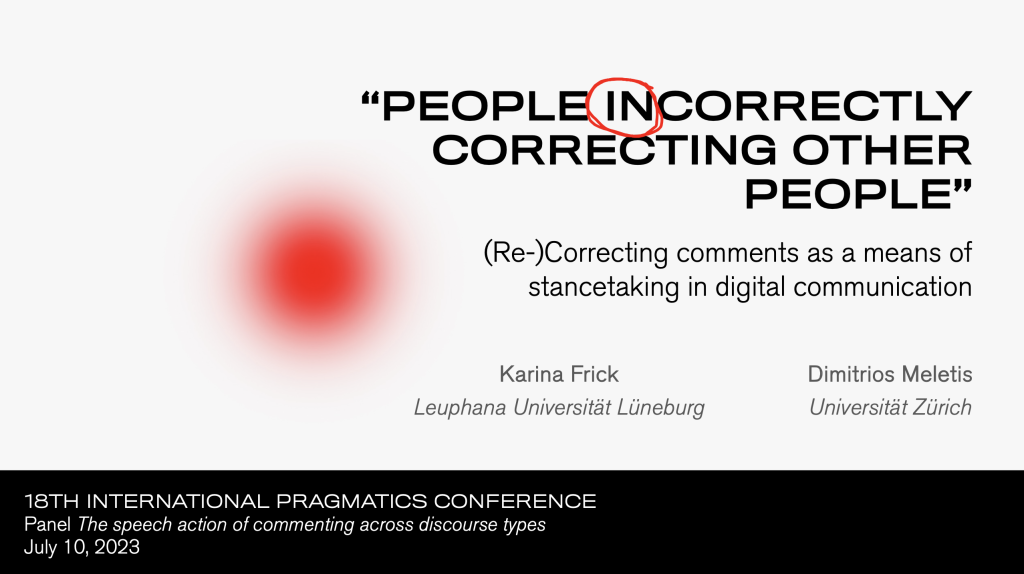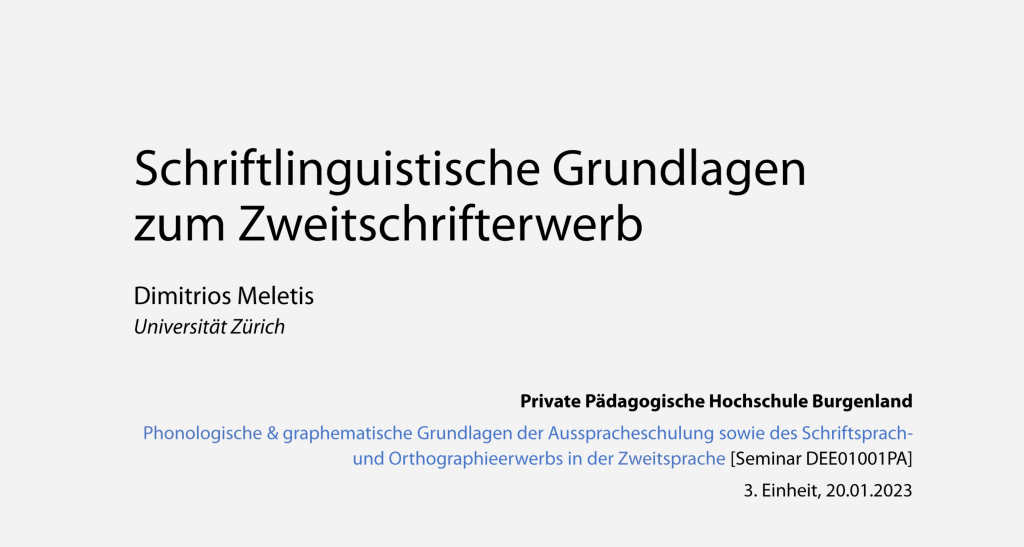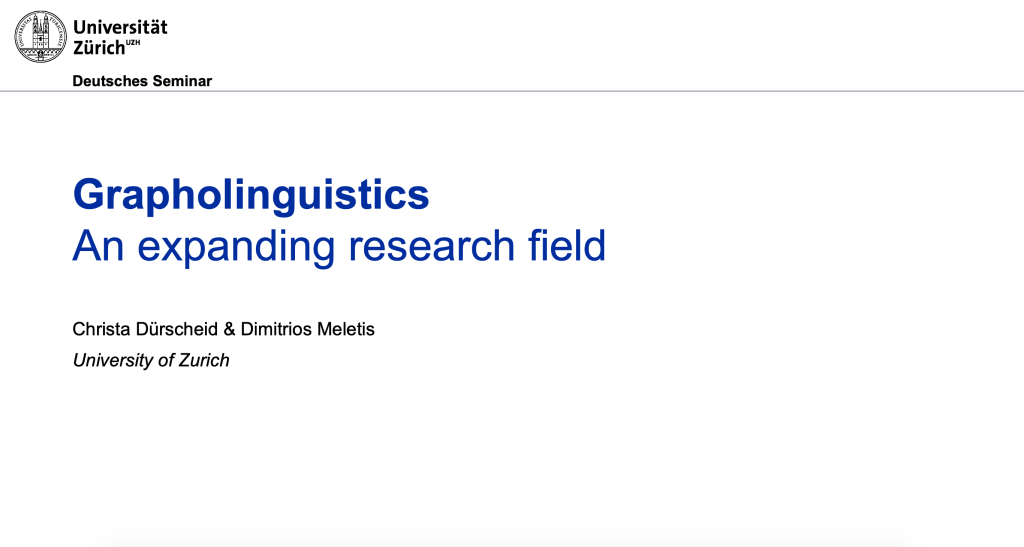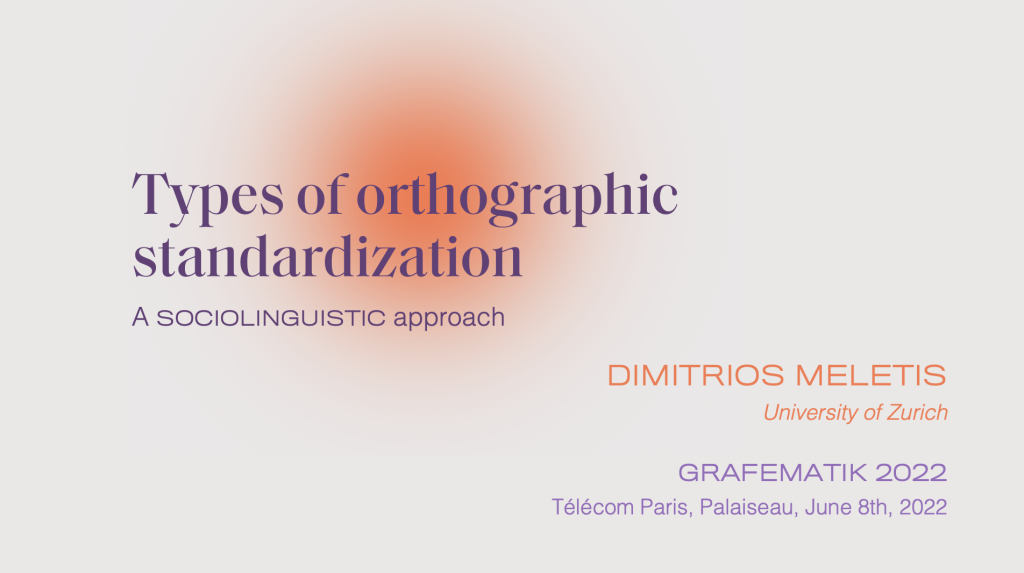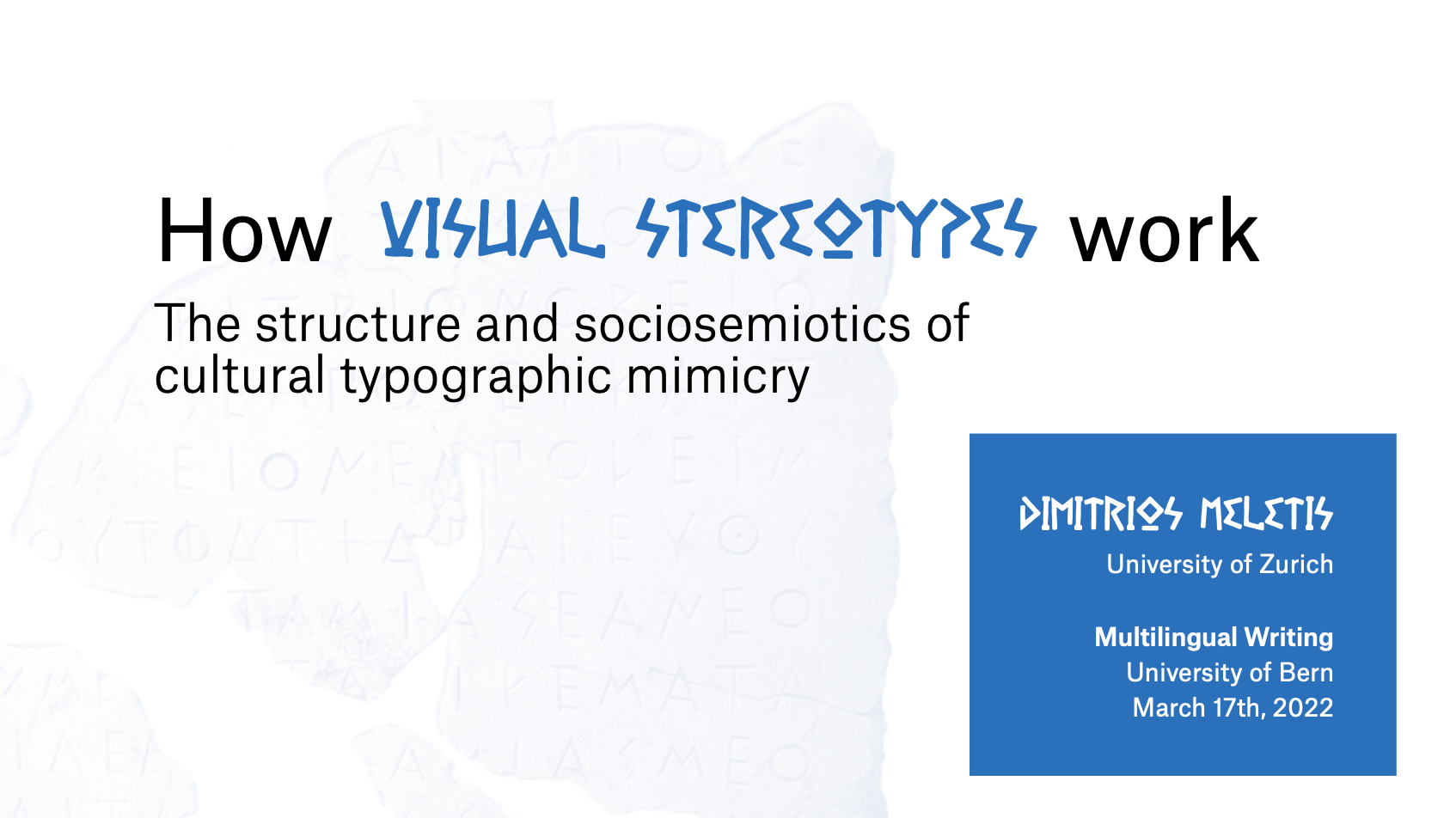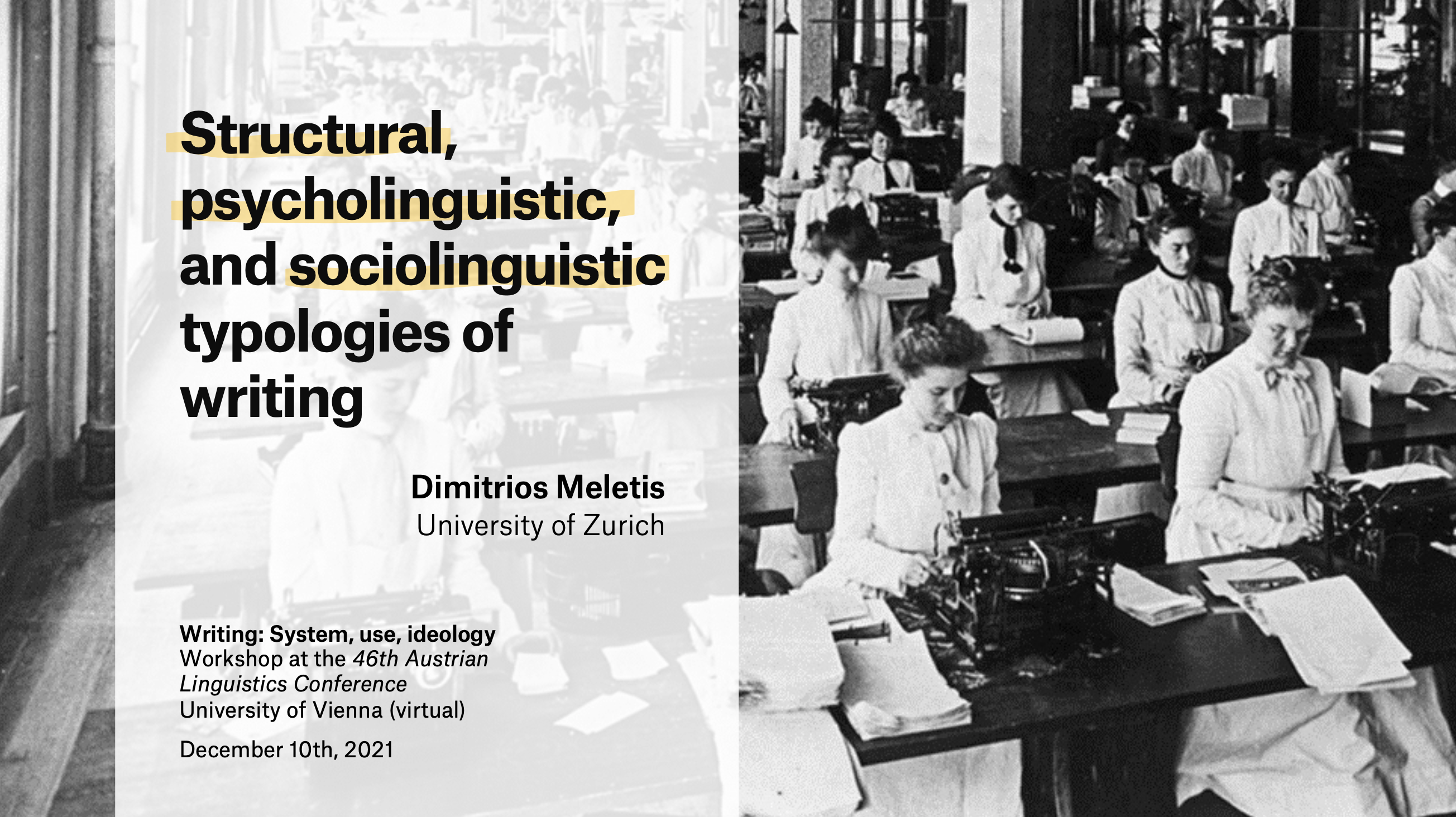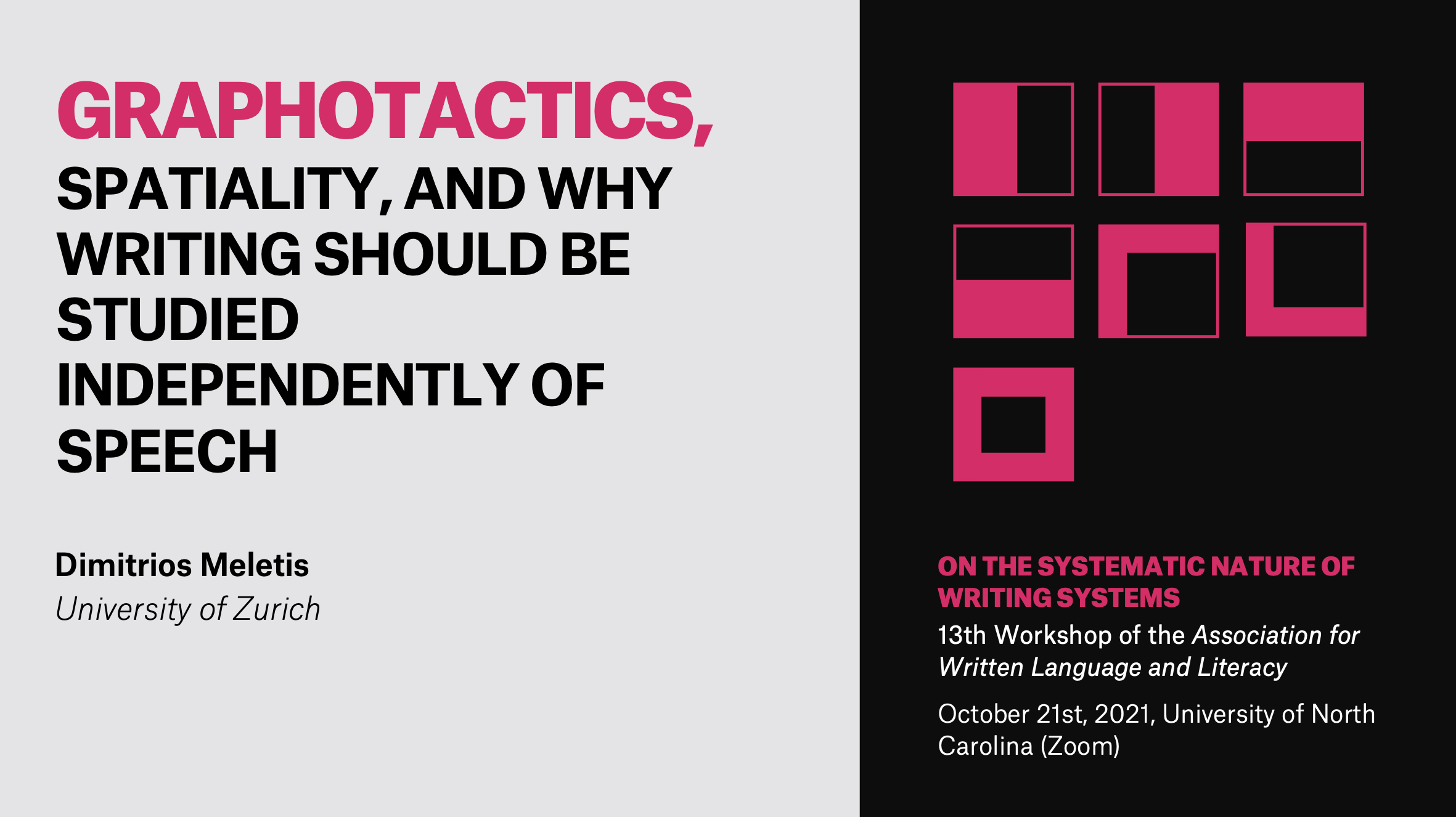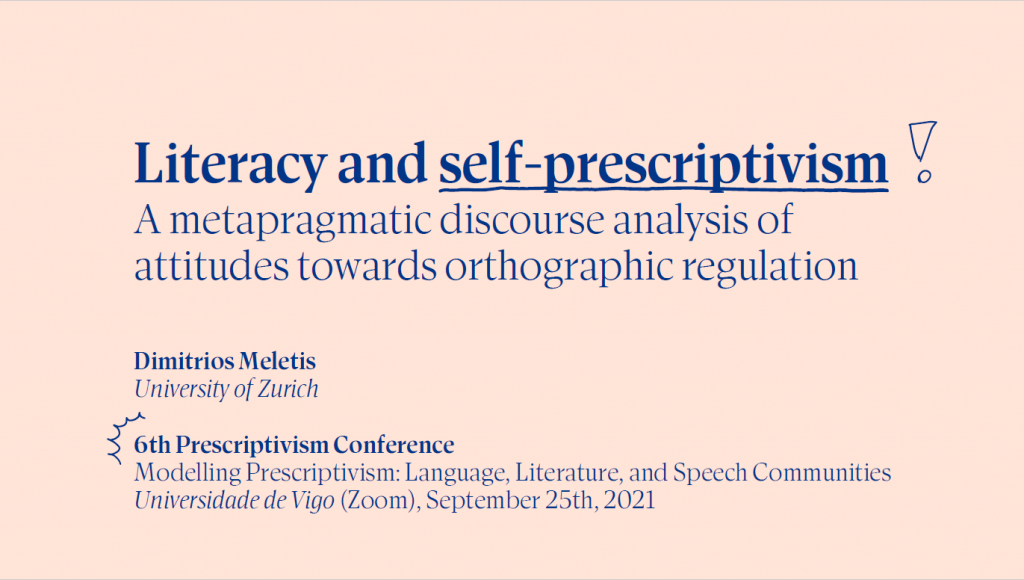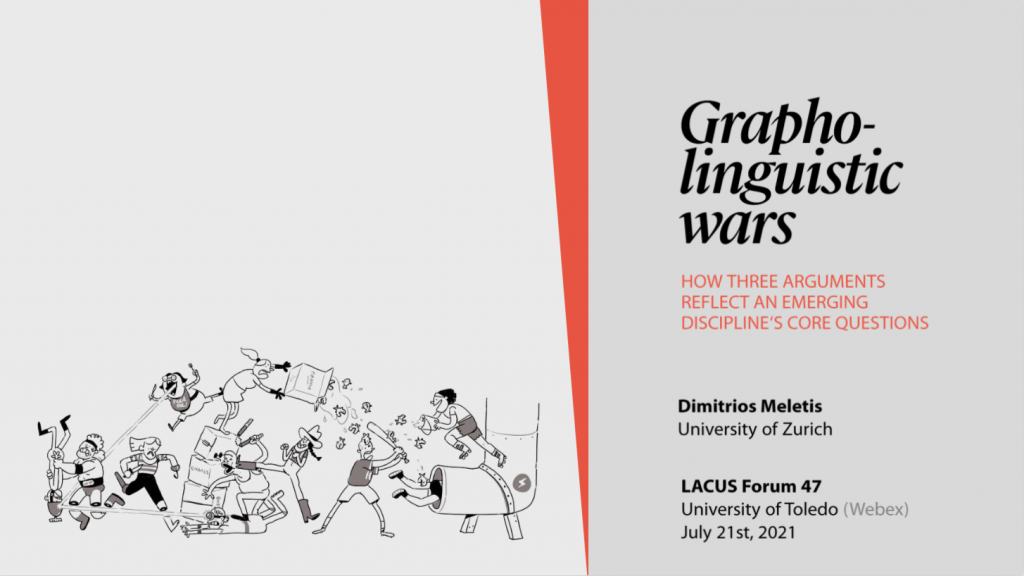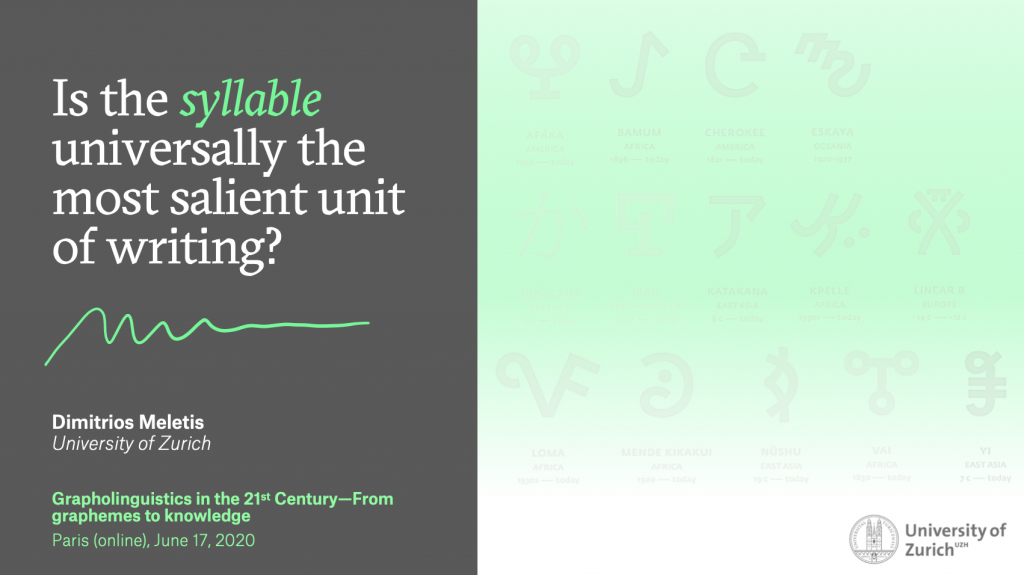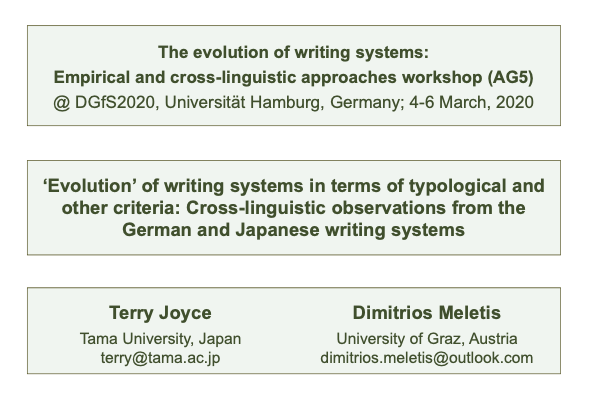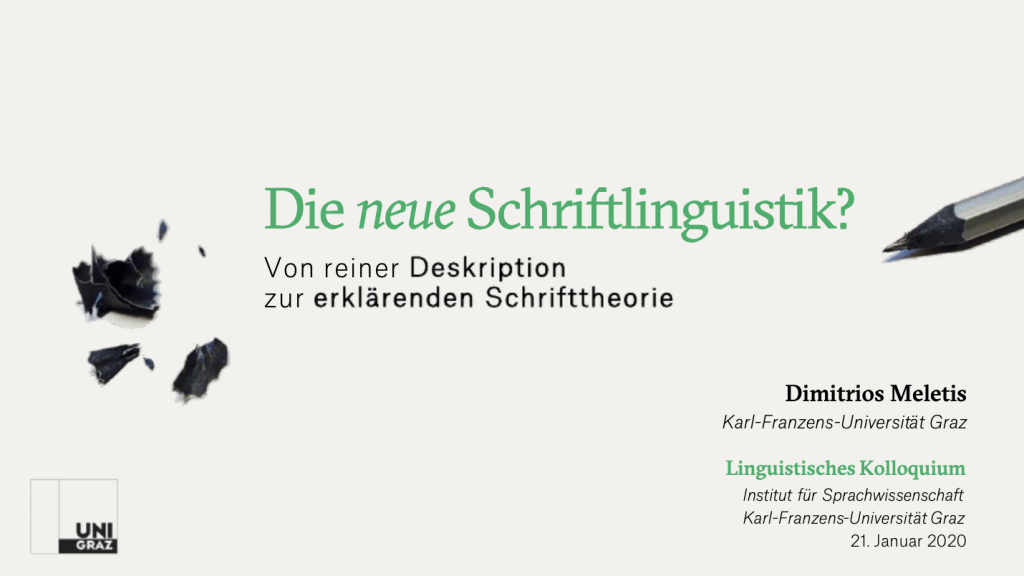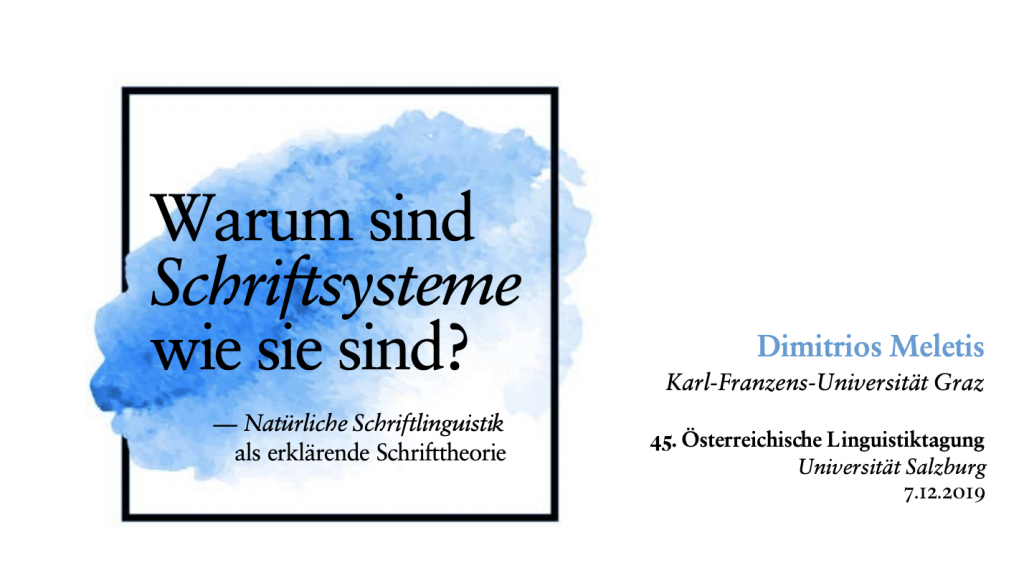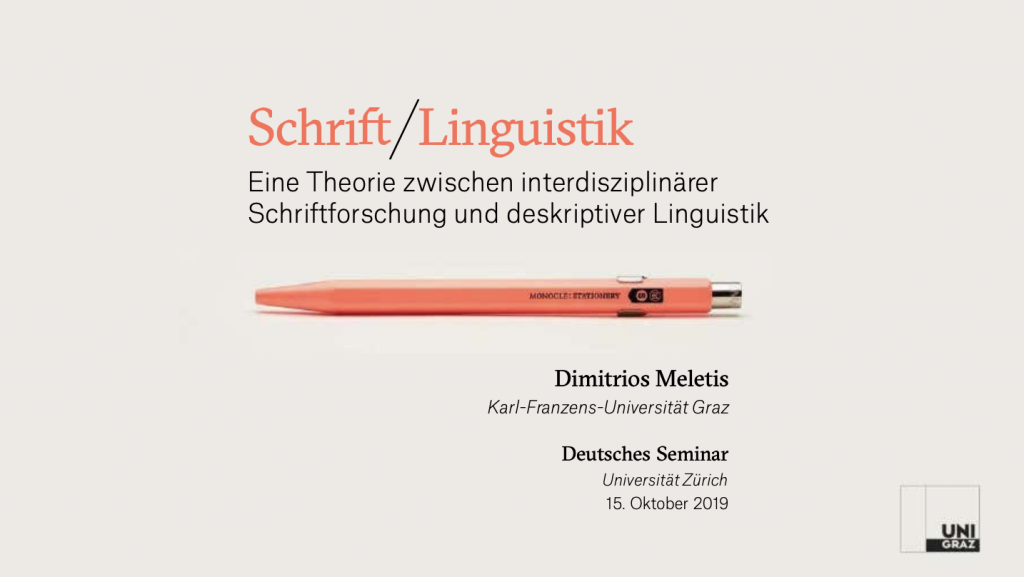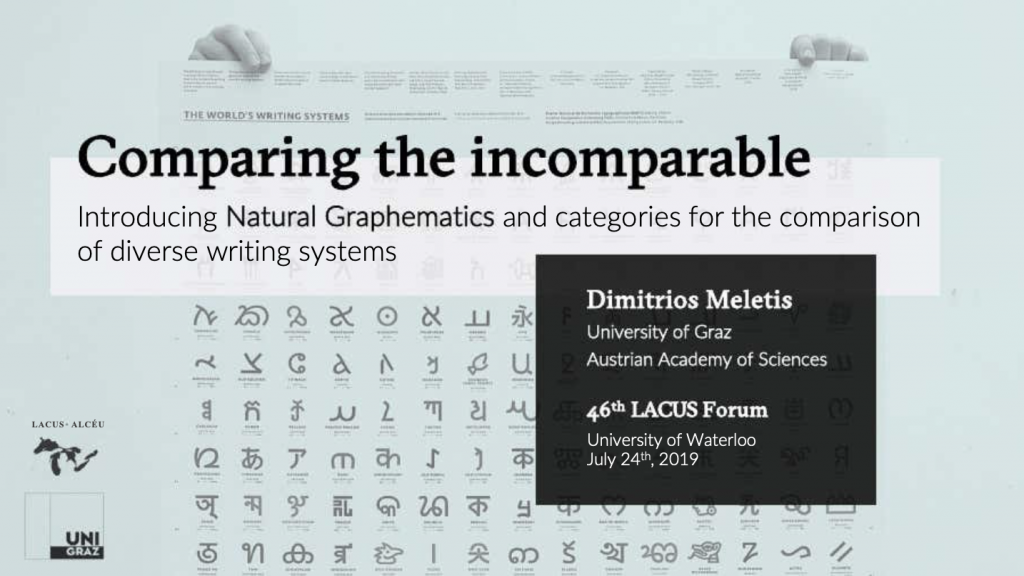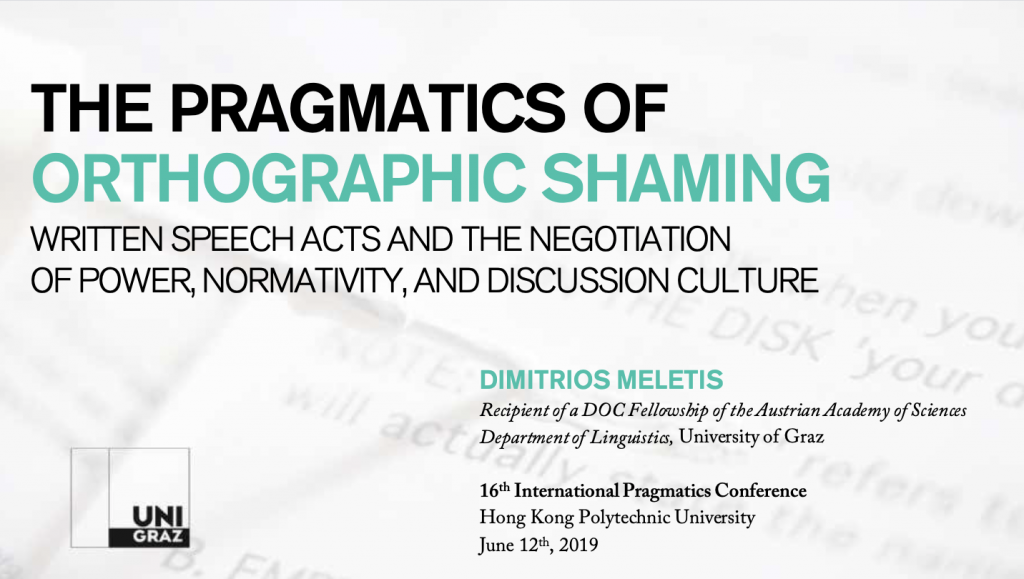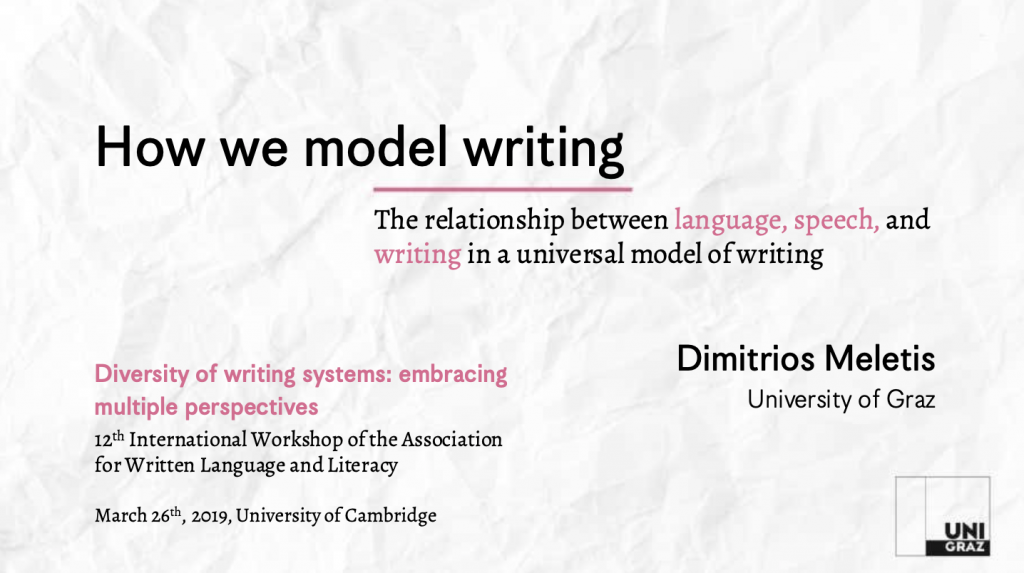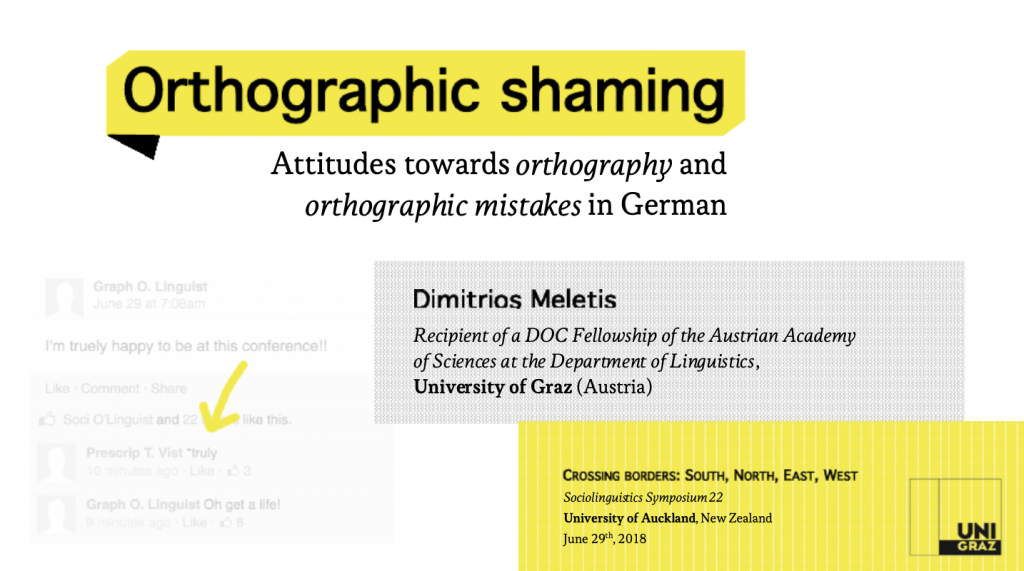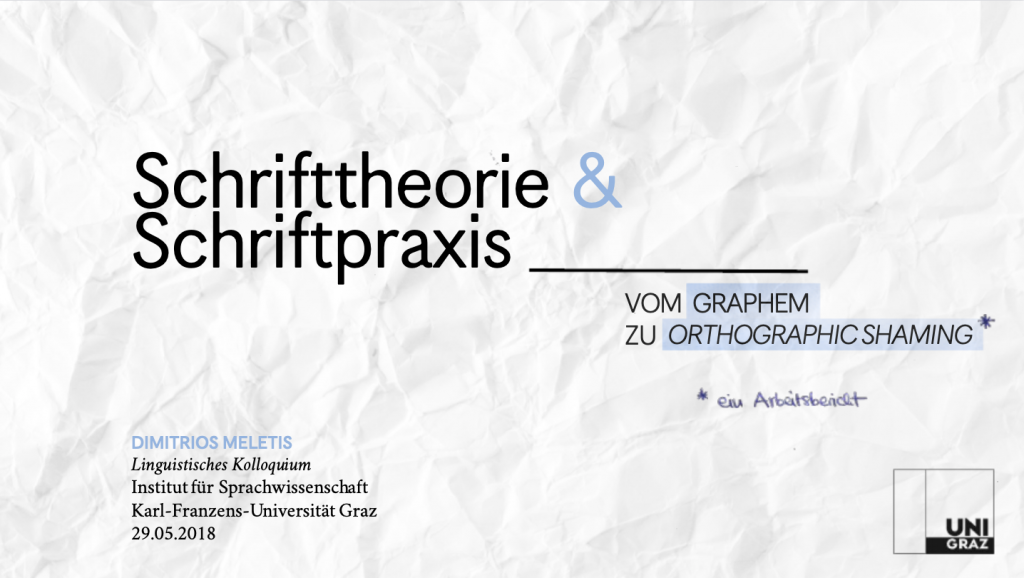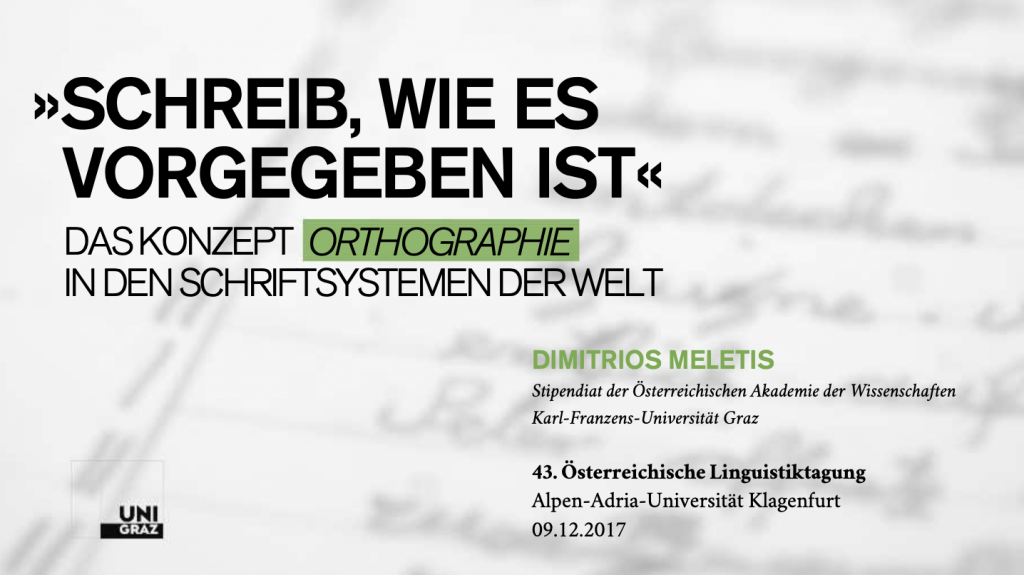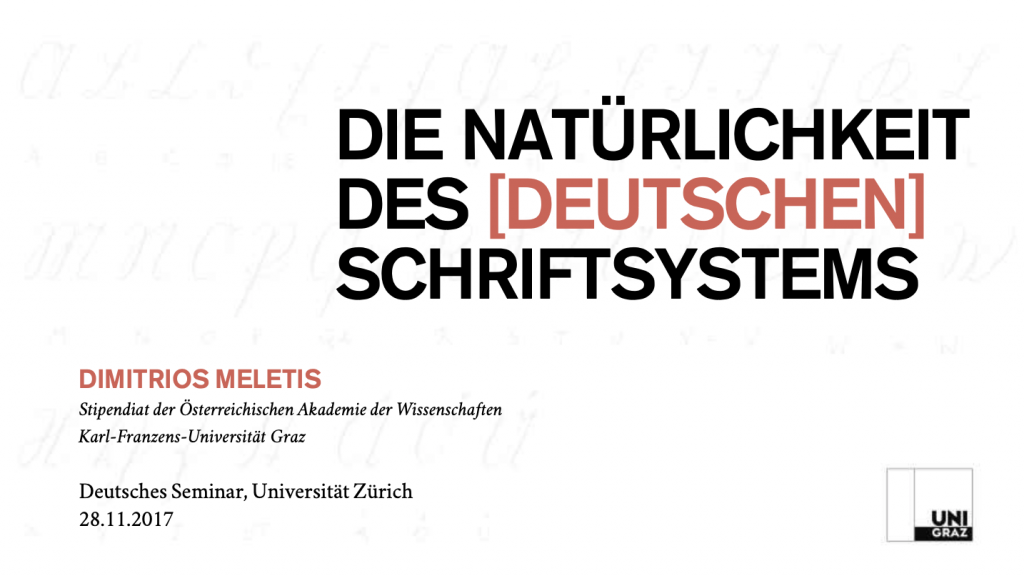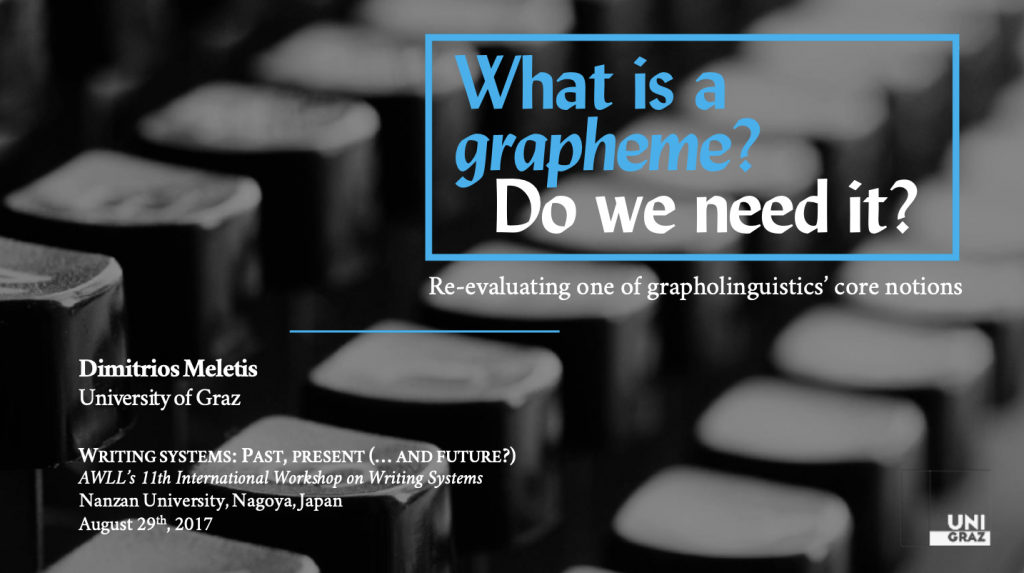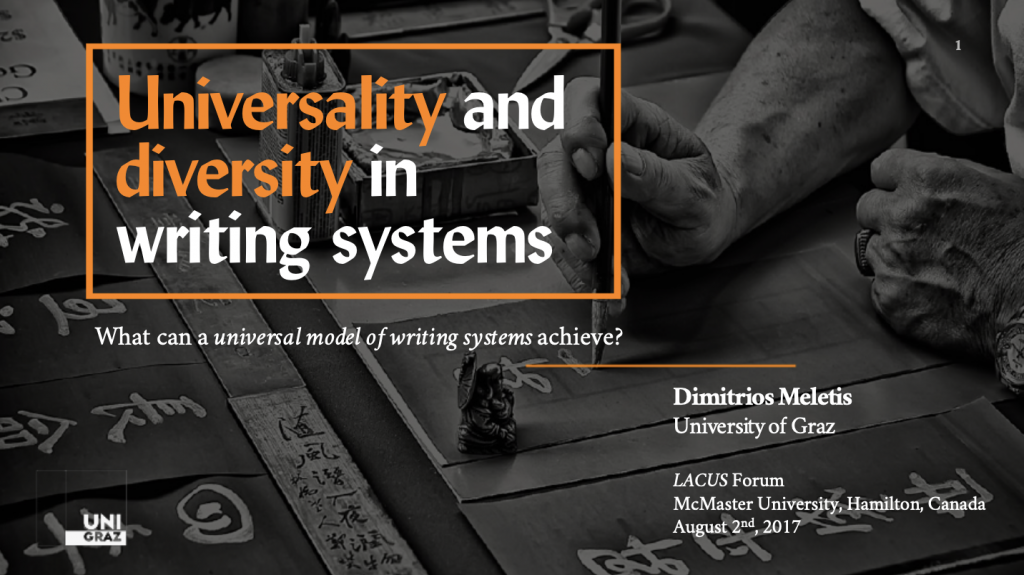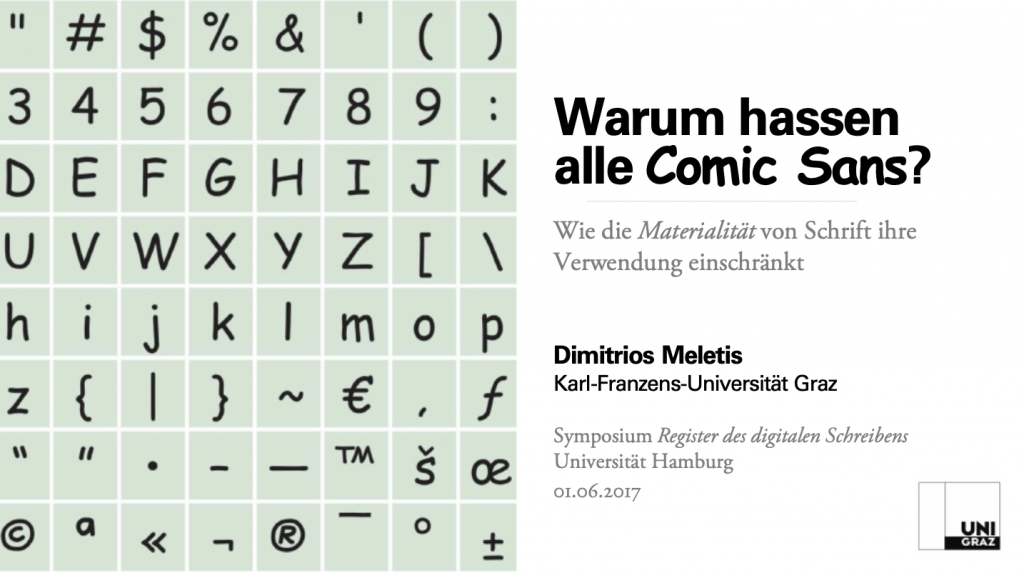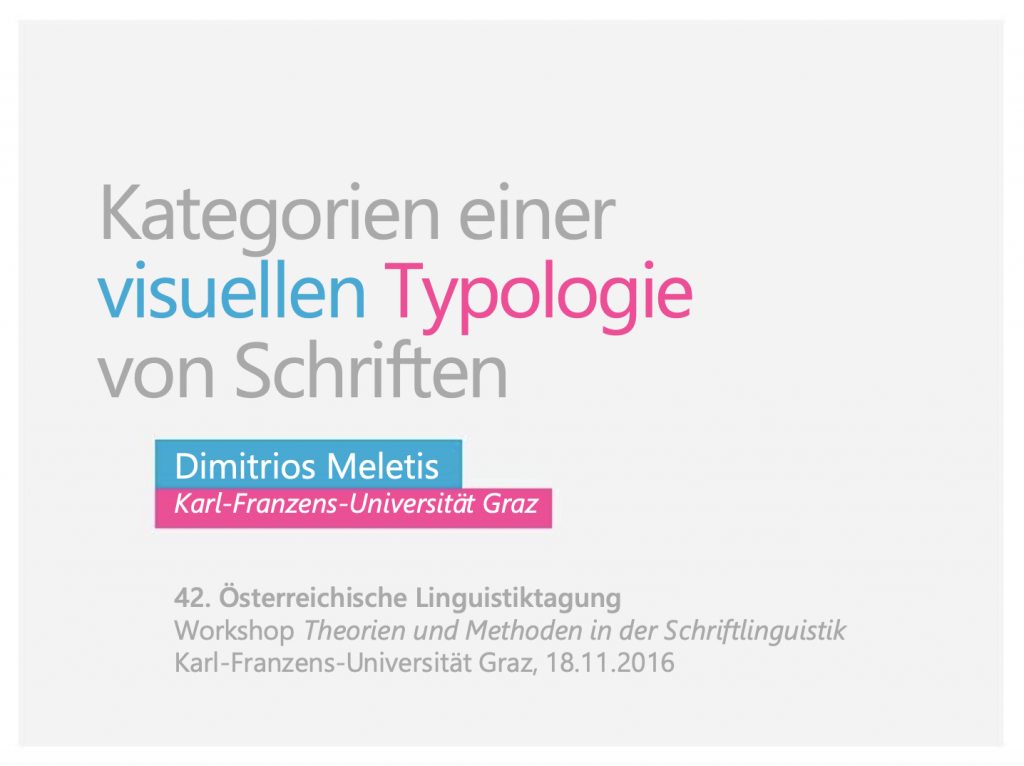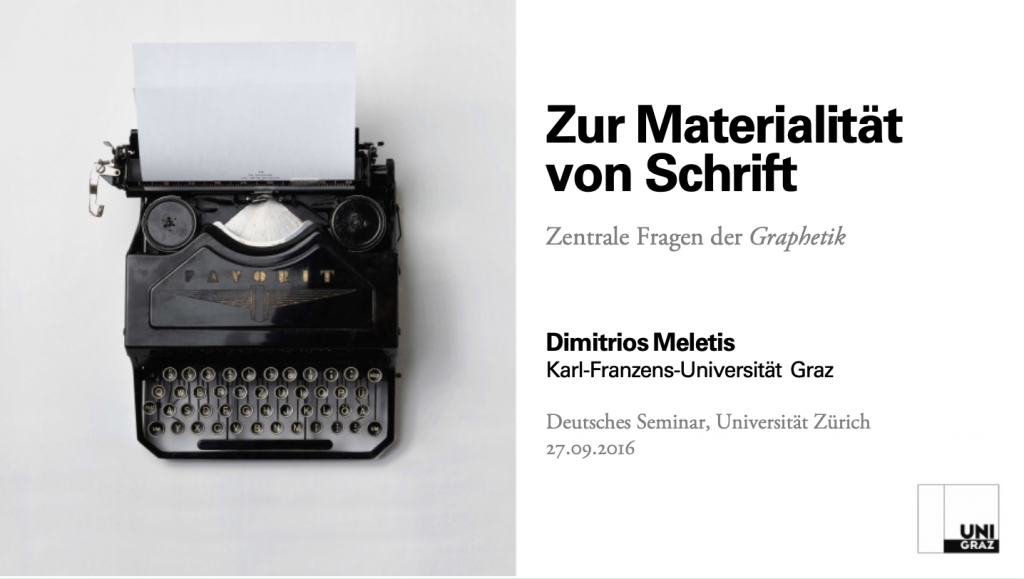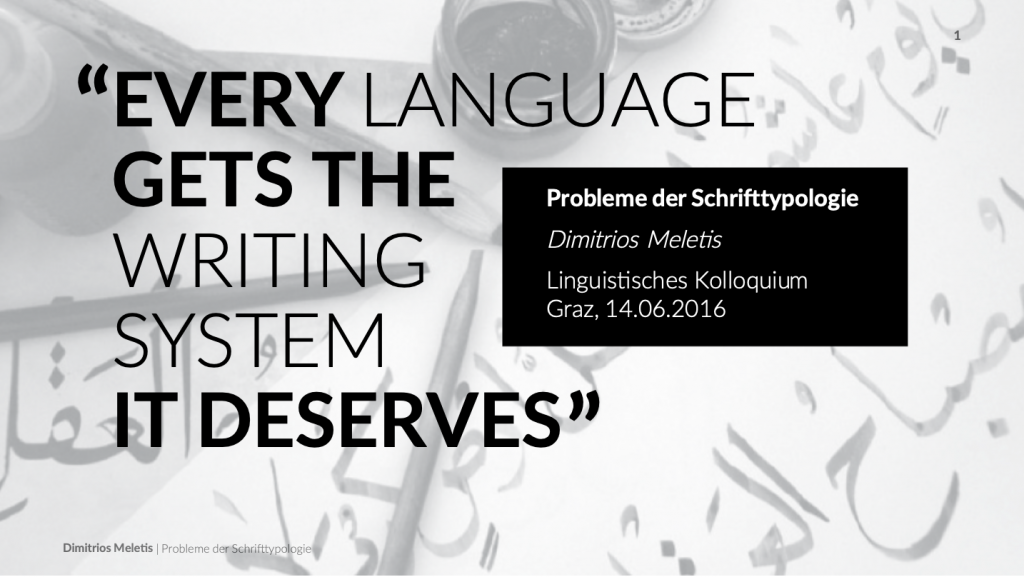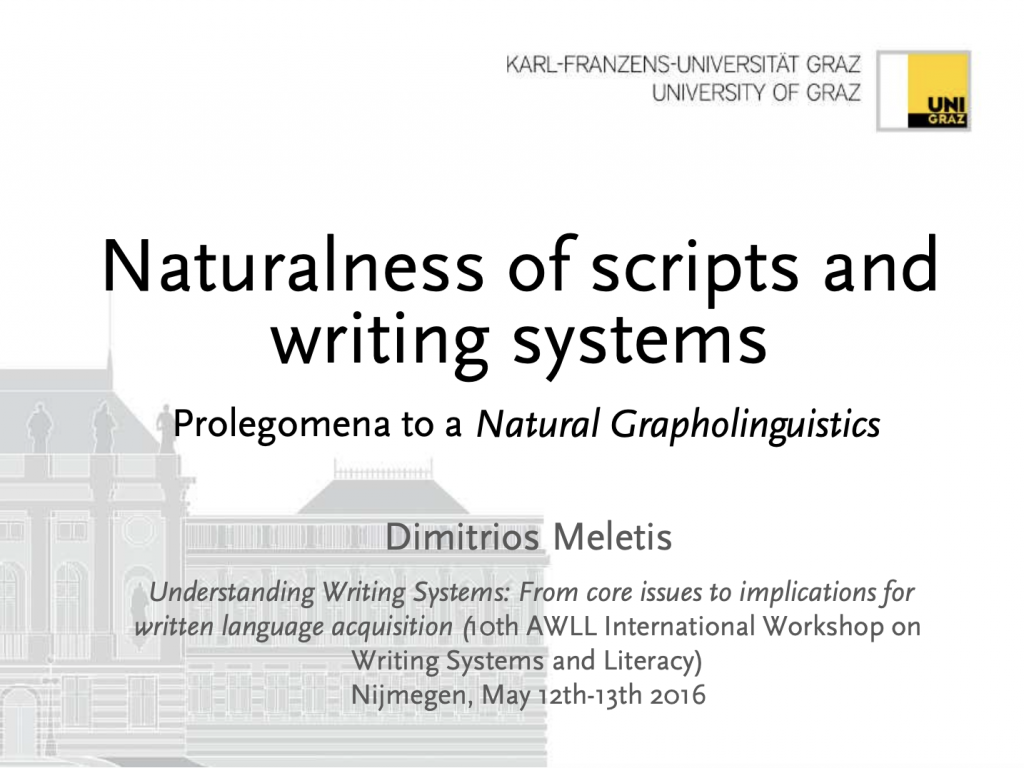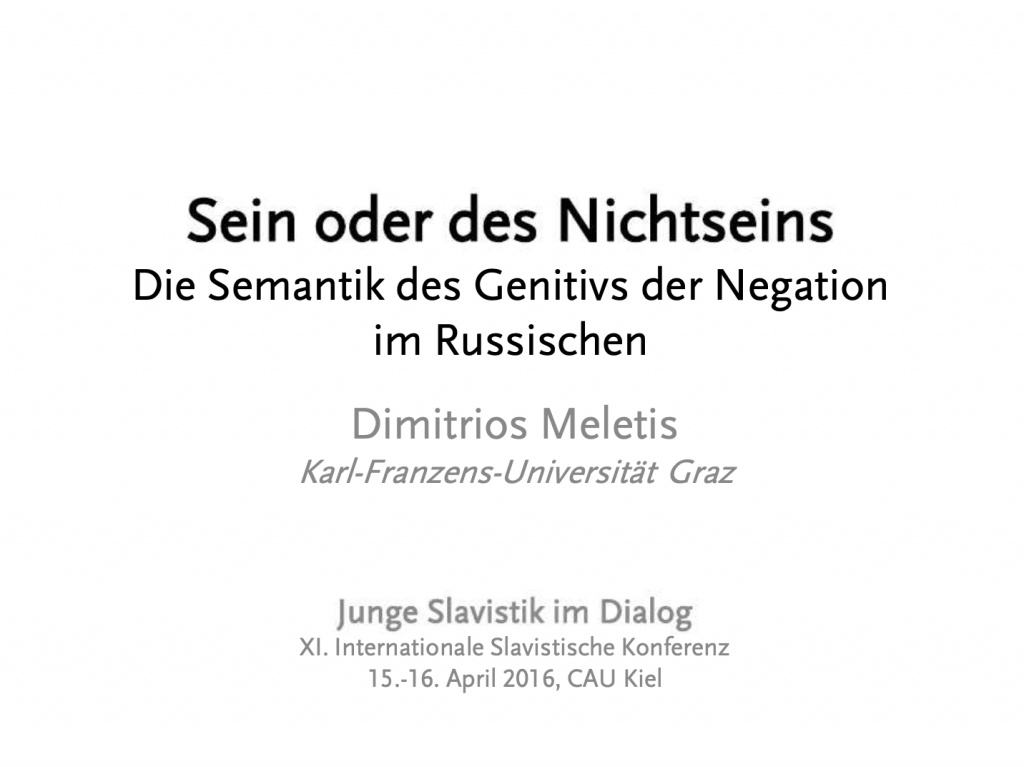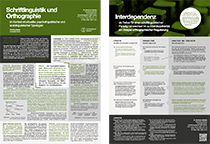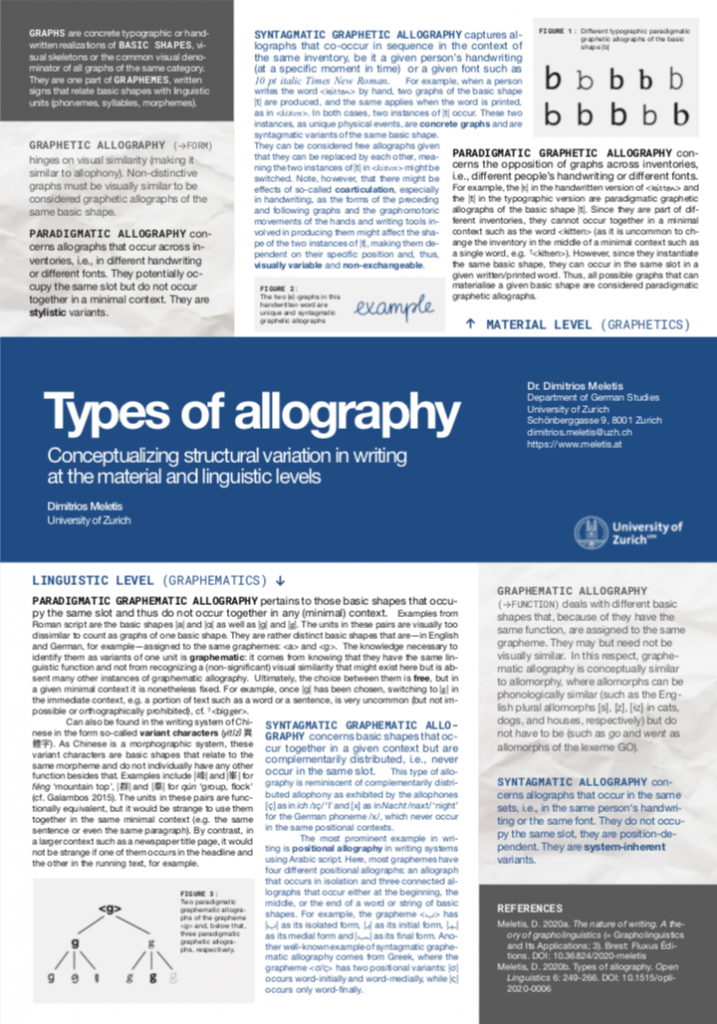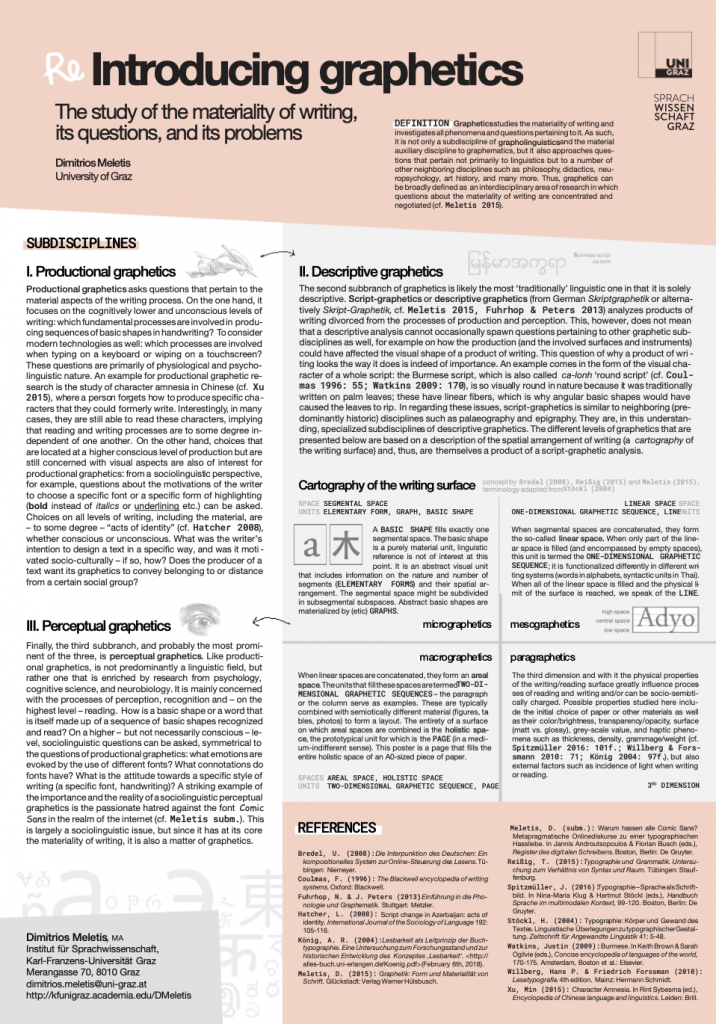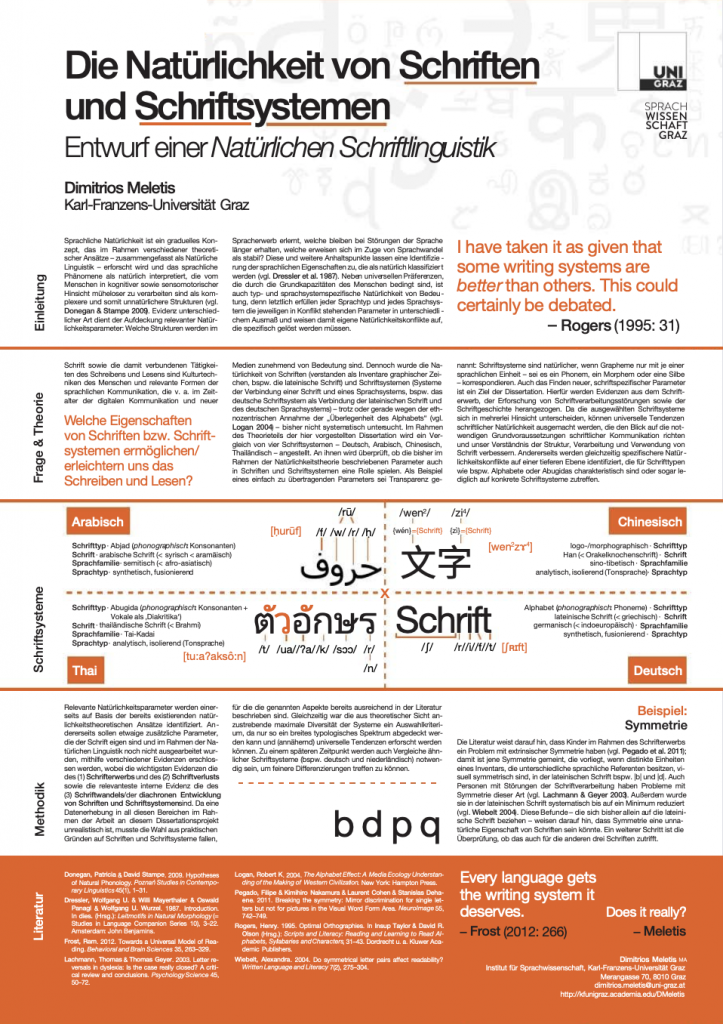About

Willkommen! — I’m Dimitrios Meletis (he/him), a linguist currently working at the University of Vienna. My main research interests are grapholinguistics (the interdisciplinary study of writing and literacy), linguistic normativity, and the (meta-)pragmatics of digital communication. In studying them, I employ a variety of methods from, among others, structuralism, discourse analysis, and sociolinguistics.
Below, you will find information on my various research projects and my teaching as well as complete lists of publications and talks. You can also download my current CV. My profiles on various research-related platforms can be reached by clicking on these symbols:
HIGHLIGHTS
あ Prior to working at the University of Vienna (AT), I was a postdoc assistant at the University of Zurich (CH) and a predoc assistant at the University of Graz (AT), where I also obtained my PhD degree in Linguistics (after having completed Bachelor’s and Master’s degrees in Linguistics and Russian).
ब My publications include, among others, two monographs on grapholinguistics—The Nature of Writing (2020) and Writing Systems and Their Use (2022, with Christa Dürscheid)—and articles on central concepts such as the grapheme or allography. I’m currently the main editor of the Handbook of Germanic Writing Systems and Literacies for De Gruyter.
Ц I’ve given over 50 talks and poster presentations since 2016—in Austria, Germany, Switzerland, Poland, Italy, Spain, France, Belgium, the Netherlands, Norway, the UK, Georgia, Canada, the USA, Mongolia, Japan, Hong Kong, Taiwan, and New Zealand—and have (co-)organized three international conference sections on the study of writing and literacy (in 2016, 2021, and 2024).
ด I’m a member of the editorial boards of the book series Grapholinguistics and Its Applications (Fluxus Editions) and the journal Written Language & Literacy (John Benjamins).
Ե I secured external funding from the Austrian Academy of Sciences (ÖAW) twice (DOC Fellowship, 2017–2020, and APART-GSK Fellowship, 2023–2027). Also, I received three awards from the Linguistic Association of Canada and the United States (LACUS) for presentations at its conferences; I was runner-up once (2017) and won first prize twice (2019, 2021).
פ I have taught introductory courses to linguistics as well as advanced courses covering grapholinguistics, negation, and CMC and have also supervised several bachelor theses on these topics. I also really enjoyed giving courses on Writing Systems at the LSA Summer Institutes 2023 (UMass Amherst) and 2025 (University of Oregon).
გ Note that I’m aware that this section of the website is incredibly performative and makes invisible my academic ‘failures’ (of which there were quite a few). I’m usually very critical of parading around neoliberal metrics and ‘selling yourself’ as well as the detrimental effects this may have on mental health, but at the same time I just enjoy documenting what I’ve done (including the setbacks) too much.
NEWS
TALK — In November 2025, I gave an invited online talk titled Attitudes and ideologies about writing systems hosted by James Myers at the National Chung Cheng University (TW).
TALK — In October 2025, I gave a talk titled ‘The worst writing system in history’: Public attitudes toward the learnability of writing systems at AWLL 15 at the Italian National Research Council (CNR), Institute for Computational Linguistics “Antonio Zampolli” (IT).
PUBLICATION — My paper Grapholinguistic wars – negotiating disciplinary identity through scholarly disagreement, which is based on a talk I gave back in 2021 at the LACUS Forum, was published in Language and History. Note that unfortunately, there is a small mistake: In Footnote 16, I mistakenly claim that Oliver Rezec (2011) erroneously speaks of a “Motor Theory of Speech Production”. He doesn’t. This is an embarrassing ‘thinko’ on my part and I apologize to Oliver Rezec. [read it anyway]
PUBLICATION — I really very strongly believe in science being open, so I strive to make available all of my publications – even the ones that are (unfortunately) not officially openly accessible. I have therefore recently uploaded preprints for several papers so that almost all of my publications are now in some form available. If you still can’t find something specific, please just email me.
TEACHING — In the winter semester of 2025/26, I am giving a course titled Writing systems, literate cultures, and linguistic normativity at the University of Graz (AT).
PUBLICATION — I honestly cannot imagine a greater honor than to be invited to contribute to the Annual Reviews of Linguistics, but that’s what (still hard to believe!) just happened. I am currently working on an article titled Linguistic constraints on writing systems, planned for the 2027 volume.
TEACHING — I’m absolutely elated that my workshop Writing systems and their use was among the ones selected for the next LSA Linguistic Institute which is taking place at the University of Oregon (US) in July/August 2025. See details [here].
KEYNOTE — I’m so grateful to have been invited back to the spraWIEN in June 2025 to take part in the keynote discussion panel Und was macht man damit? Karrierewege mit einem sprachbezogenen Studium.
TALK — In December 2024, I gave an invited talk titled Reflexion über Schrift und Schreiben in Florian Busch’s course Metasprache und kommunikative Reflexivität: Wie wir über Sprache denken, sprechen und schreiben at the University of Bern (CH).
PUBLICATION — After many years of being in the works, the (German-language) dictionary Schriftlinguistik, edited by Martin Neef, Said Sahel, and Rüdiger Weingarten, has now been published in print as the third volume in the Dictionaries of Linguistics and Communication Science series from De Gruyter. I am honored that I could contribute 38 articles to it from the fields of graphetics and writing system typology. [see it here]
TALK — At the end of October, I gave a talk titled Types of iconicity in phonographic writing systems, at the Grapholinguistics in the 21st Century 2024 conference taking place in Venice at the Università Ca’ Foscari (IT). I’m very happy that my talk was voted the 3rd best paper of the conference!
PUBLICATIONS — My historiographic paper What’s in a name? Trends and challenges in naming the study of writing has now finally been published as part of the /grafematik/ 2022 proceedings. [read it]
WORKSHOP AND TALK — Together with Stefan Hartmann, Kristian Berg, and Jessica Nowak I organized the workshop Cognitive approaches to written language, which was part of the 10th International Conference of the German Cognitive Linguistics Association taking place in Osnabrück (DE) in September 2024. I also gave a talk there, titled Every language gets the writing system its users can process: Exploring the relation between the linguistic and processing fits.
PUBLICATIONS — My paper People incorrectly correcting other people: The pragmatics of (re-)corrections and their negotiation in a Facebook group, written together with Karina Frick, was just published in Discourse, Context & Media. [view it]
Archive (Click to open)
08/24 – TALK — At the 16th International Conference on the History of the Language Sciences, which took place at the end of August 2024 at Tbilisi Ivane Javakhishvili State University (GE), I gave a talk titled Between dependency and autonomy: The relationship between speech and writing in early structuralist Schriftlinguistik and its impact on concepts of the study of writing.
06/24 – TALK — At the 7th Prescriptivism Conference, which took place in the end of June 2024 at Aix-Marseille University (FR), I gave a talk titled Critical metaprescriptivism: An exploratory analysis of attitudes towards grassroots prescriptivism in a pertinent Facebook group.
06/24 – TALK — I’m happy to have been invited to give the keynote at the conference spraWIEN, which took place on 15 June 2024 at the University of Vienna (AT). My talk was titled How to find your academic self — and keep it healthy. You can watch it [here].
05/24 – TALK — I’m honored to have been invited to give a talk titled Grapholinguistics as an interdisciplinary framework for the synchronic and diachronic study of writing at the conference Ancient languages and writing systems in contact, which took place on 27—28 May 2024 at University of Rome ‘La Sapienza’ (IT).
04/24 — CONTINUING EDUCATION — In April 2024, I offered a punctuation-themed course titled Interpunktionsregeln verstehen: Wie kleine Zeichen unser Lesen steuern at the University of Zurich’s Center for Continuing Education (CH). You can find more information [here].
03/24 – PUBLICATIONS — My article Schriftlinguistik interdisziplinär, multiperspektivisch, komparativ: Die Erarbeitung struktureller, psycholinguistischer und soziolinguistischer Typologien was just published in the book Orthographie in Wissenschaft und Gesellschaft: Schriftsystem – Norm – Schreibgebrauch. [view it]
03/24 – WORKSHOP — Unfortunately, there were too few abstract submissions for my in-person workshop Traditions in the study of writing worldwide, which was to be a part of ICHoLS XVI (International Conference on the History of the Language Sciences). The workshop is currently being reconceptualized as an online conference to be held later this year. Updates will be shared here; if you are generally interested in giving a talk, please contact me.
02/24 – PUBLICATIONS — My two encyclopedia articles covering the Alphabet and Literacy (click to view), which will be part of the 3rd edition of the Encyclopedia of Language and Linguistics, have already been published online as part of the Elsevier Reference Collection in Social Sciences.
12/23 — TALK — In December 2023, I gave a guest lecture (online) at the University of Bonn (DE) titled Schriftlinguistik interdisziplinär, multiperspektivisch, komparativ – Strukturelle, psycholinguistische und soziolinguistische Aspekte.
12/23 — TALK — At the 47th Austrian Linguistics Conference hosted by the University of Graz (AT) in December 2023, in the workshop Emerging Linguists, I gave a talk titled Eine Nische finden: Linguistische Karrierewege zwischen intrinsischer Motivation und strategischem Denken.
11/23 — SCIENCE-TO-PUBLIC — On November 16, 2023, I gave a talk titled Der Mensch und seine Schriften: Visuelle Vielfalt zwischen Sprache, Natur und Kultur (The human and his scripts: Visual diversity between language, nature, and culture) at the VHS Urania in Vienna (AT). It was an accessible talk aimed at a broad, non-academic audience. [more information]
11/23 – TALK — At the 14th AWLL international workshop on writing systems and literacy hosted by Temple University in Rome (IT) in November 2023, I gave a talk titled Literacy fosters normativity: Exploring how material and functional features of writing relate to linguistic norms.
09/23 – TALK — At the Comparative Punctuation Worldwide conference held at the University of Regensburg (DE) in September 2023, I gave a plenary talk together with Jonas Romstadt (Universität Bonn) titled What is the graphem(at)ic status of punctuation units? Toward basic operational concepts of comparative punctuation research.
09/23 – TALK — At the Visiolinguistics: Panoramas of languaging and visuality conference hosted virtually by the Open University in Milton Keynes (UK) in September 2023, I discussed my pre-recorded talk titled Writing de/scrib/ing itself – How the duality of writing as a metalinguistic instrument and research object challenges a Descriptive Grapholinguistics.
07/23 – FELLOWSHIP/FUNDING — I am incredibly happy that for my project Orthographic relativity: Comparing the relation between literacy and normativity across writing systems and literate cultures I was granted an APART-GSK Fellowship by the Austrian Academy of Sciences for the duration of four years. I am receiving my funding at the University of Vienna (AT), where I started working in September 2023.
07/23 – Invited TALK — I am incredibly honored to have given a talk as an invited speaker at this year’s international SCRIPTA conference organized by the Hunmin jeongeum Society at the National University of Mongolia in Ulaanbaatar (MN) in July 2023. The title of the talk was Open questions in the cross-linguistic conception of the grapheme: Linguistic value, (supra)segmentality, and cognitive reality.
07/23 – TALK — At the 18th International Pragmatics Conference in Brussels (BE) in July 2023, I gave a talk with Karina Frick (Leuphana Universität Lüneburg) titled ‘People incorrectly correcting other people’: (Re-)Correcting comments as a means of stance-taking in digital communication.
06/23 – PUBLICATION — Six new entries written by me (Determinativum, inhärenter Vokal, Kurzzeichen, Langzeichen, Phonetikum, Syllabogramm) were published in the WSK dictionary Schriftlinguistik (ed. by Martin Neef, Said Sahel, and Rüdiger Weingarten). [go to dictionary]
06/23 – TEACHING — I recently enjoyed teaching my course Writing Systems as one of the few selected for the LSA Linguistic Summer Institute, which took place from June 19 to July 14, 2023 at the University of Massachusetts Amherst (US). [more information]
RESEARCH
My research is interdisciplinary and integrates multiple perspectives: I adhere to functionalist and explanatory usage-based approaches to linguistics and am interested not only in the structures we find in the various modalities of language (especially writing) and how they can be adequately studied and described, but also in how they are used, i.e., processed cognitively and physiologically, as well as what roles they play sociopragmatically and culturally. Language is a semiotic system but also a medium that must be processed, and an instrument of communication. Acknowledging these different facets makes necessary the combination of theoretical approaches and methods from various disciplines.
In this vein, my research on the cross-linguistic comparative description of writing systems has resulted in the proposal of an explanatory theory of writing and literacy as well as the plea for an integration of writing into mainstream linguistic theories and paradigms. Specifically, I claim that writing is not merely one possible modality of language: with respect to linguistic norms as well as prescriptive attitudes and behavior, literacy and the profound way it shapes our view of language and language standards are arguably constitutive (key words in this context are written language bias and graphic relativity). Find out more about my main research projects by clicking on one of the numbered headings below.
Research interests
In the drop-down descriptions of the different strands, you will find pertinent research outputs (such as publications, talks, and taught courses). If you prefer complete and chronological lists, you can find them below.
I. Grapholinguistics
Much of my research has been devoted to the study of different aspects of writing and literacy, which are all subsumed by the interdisciplinary field of grapholinguistics. While this field is well established in the German-speaking realm—as Schriftlinguistik—it is still emerging more internationally. In my doctoral research, funded by the Austrian Academy of Sciences and conducted at the University of Graz (AT), I carved out a framework for the description of typologically diverse writing systems (including basic comparative concepts such as grapheme or graphotactics). Using this framework as a basis, I aimed for explanation, i.e., the question of why writing looks and functions the way it does (and has developed diachronically to what it is today)—as a semiotic system linked to language, a medium in need of physiological and cognitive processing, and a mode of communication deeply anchored in individual cultures. To achieve this, I relied on a functionalist usage-based approach (linguistic Naturalness Theory) and considered external writing-related evidence from a range of disciplines (e.g., psychology, IT, sociology, design theory), embracing the interdisciplinary nature of writing as a subject and grapholinguistics as a field. Find details on the various sub-aspects of my grapholinguistic research by clicking one of the headings below the Research Output box.
Research output
Key publications
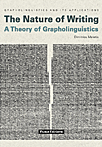
[2020] The nature of writing: A theory of grapholinguistics (Grapholinguistics and Its Applications 3). Brest. Fluxus Editions. DOI: 10.36824/2020-meletis. [↗︎]
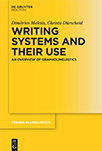
Other publications
[accepted, with Stefan Hartmann & Rebecca Treiman] Handbook of Germanic Writing Systems and Literacies (Handbooks of Germanic Linguistics). Berlin, Boston: De Gruyter.
[2026, with Christa Dürscheid] Grapholinguistics as a unified framework for the cross-linguistic study of writing In Michael Schulte, Paola Cotticelli, Gaby Waxenberger & Kerstin Kazazzi (eds.), From the Maya Script to the Germanic Runes (ScriptandSound 6). Wiesbaden: Reichert.
[2024a] What’s in a name? Trends and challenges in naming the study of writing. In Yannis Haralambous (ed.), Grapholinguistics in the 21st Century 2022. June 8–10, 2022. Proceedings, Part I (= Grapholinguistics and Its Applications 9), 1–44. Brest: Fluxus Editions. DOI: 10.36824/2022-graf-mele.
[2024b] Schriftlinguistik interdisziplinär, multiperspektivisch, komparativ: Die Erarbeitung struktureller, psycholinguistischer und soziolinguistischer Typologien. In Sabine Krome, Mechthild Habermann, Henning Lobin & Angelika Wöllstein (eds.), Orthographie in Wissenschaft und Gesellschaft: Schriftsystem – Norm – Schreibgebrauch (Jahrbuch 2023 des IDS), 399–410. Berlin, Boston: De Gruyter. DOI: 10.1515/9783111389219-022.
[2021] On being a grapholinguist. In Yannis Haralambous (ed.), Grapholinguistics in the 21st Century. June 17–19, 2020. Proceedings, Part I (Grapholinguistics and Its Applications 4), 47–62. Brest: Fluxus Editions. DOI: 10.36824/2020-graf-mele.
Third-party funds
[2022] Gold Open Access Funding for book Writing systems and their use: An overview of grapholinguistics (€ 7000), Schweizerischer Nationalfonds (SNF)
[2017–2020] DOC Fellowship for project Naturalness in Scripts and Writing Systems: Outlining a Natural Grapholinguistics (€ 82333), Österreichische Akademie der Wissenschaften (ÖAW)
Award
[2021] Prize for an Outstanding Doctoral Dissertation by the Faculty of Arts and Humanities, Karl-Franzens-Universität Graz
Conference Activity
[2024] Talk Grapholinguistics as an interdisciplinary framework for the synchronic and diachronic study of writing, Ancient languages and writing systems in contact, Sapienza Università di Roma (IT)
[2023a] Talk Schriftlinguistik interdisziplinär, multiperspektivisch, komparativ – Strukturelle, psycholinguistische und soziolinguistische Aspekte, Universität Bonn (DE)
[2023b] Talk Writing de/scrib/ing itself: How the duality of writing as a metalinguistic instrument and research object challenges a Descriptive Grapholinguistics, Visiolinguistics: Panoramas of languaging and visuality, Open University (UK)
[2022, with Christa Dürscheid] Keynote Grapholinguistics – An expanding research field, LautSchriftSprache 5 – From the Maya Script to Germanic Runes, Universitetet i Agder (NO)
[2021] Organized Workshop Writing: System, use, ideology, 46th Austrian Linguistics Conference, Universität Wien (AT)
[2019] Talk Schrift/Linguistik – Eine Theorie zwischen interdisziplinärer Schriftforschung und deskriptiver Linguistik, Guest Lecture at Deutsches Seminar, Universität Zürich (CH)
[2016] Organized Workshop Theorien und Methoden in der Schriftlinguistik, 42th Austrian Linguistics Conference, Karl-Franzens-Universität Graz (AT)
Editorial work
[since 2022] Member of Editorial Board of Journal Written Language & Literacy (John Benjamins)
[since 2020] Member of Editorial Board of Book Series Grapholinguistics and Its Applications (Fluxus Editions)
Teaching
[2025] Writing Systems and Their Use, University of Oregon (LSA 2025 Linguistic Institute)
[2023] Writing Systems, University of Massachusetts Amherst (LSA 2023 Linguistic Institute)
[2021] Das deutsche Schriftsystem aus komparativer Sicht, Universität Zürich
[2017] Perspektiven der Schriftlinguistik, Karl-Franzens-Universität Graz
1. Graphetics
My grapholinguistic research started with the study of written materiality; the resulting master’s thesis focused on graphetics and was published as a revised and extended monograph. Its main question is how material features of writing had been treated in linguistics prior to a ‘material turn’. Adopting fruitful ideas from German structural linguistics stemming from a circle surrounding Hartmut Günther, Konrad Ehlich, Florian Coulmas et al., I proposed a descriptive model of the German writing system relying on spatial characteristics (such as empty spaces). Consequently, through reviewing interdisciplinary research on reading, I explored the psychological reality and critically reflected the value of my descriptive proposals. This survey underlined that the identified material aspects of visual data cannot be neglected as they are vital in constituting the meaning and function(s) of texts, assuming a prominent role in their cognitive processing. I have since continued to study various cognitively and communicatively relevant visual aspects of writing—such as iconicity and diagrammaticity, spacing, directionality, typographic features—that have shaped its development and affect its use.
Research output

Key publication
[2015] Graphetik: Form und Materialität der Schrift (Typo|Druck). Glückstadt: Werner Hülsbusch.
Conference Activity
[2022] Talk How visual stereotypes work, Multilingual Writing, Universität Bern (CH)
[2018] Poster Reintroducing graphetics: The materiality of writing, its questions, and its problems, Writing conventions and pragmatic perspectives, Université Libre de Bruxelles (BE)
[2016] Talk Zur Materialität von Schrift: Zentrale Fragen der Graphetik, Guest lecture at Deutsches Seminar, Universität Zürich (AT)
Award
[2015] Best Peer-reviewed Publication on the Basis of the Master’s Thesis, awarded by the Faculty of Arts and Humanities, Karl-Franzens-Universität Graz
Other publications
[accepted] The skeletons and dresses of writing systems: A (grapho)linguistic perspective on graphic structure and variation. In Paul Luna, Fiona Ross, Aaris Sherin, Sue Walker & Vaibhav Singh (eds.), Bloomsbury Handbook of Global Typography. London: Bloomsbury.
[2023] ‘Is your font racist?’ Metapragmatic online discourses on the use of typographic mimicry and its appropriateness. Social Semiotics 33.5: 1046–1068. DOI: 10.1080/10350330.2021.1989296.
[2022] Typographische Mimikry. In Ursula Rautenberg & Anja Voeste (eds.), Typographie: Theoretische Konzeptionen, historische Perspektiven, künstlerische Applikationen (Bibliothek des Buchwesens 31), 68–79. Stuttgart: Hiersemann.
[2020] Reintroducing graphetics: The study of the materiality of writing. Scripta 11: 91–131.
[2016] Review of Tilo Reißig. 2015. Typographie und Grammatik. Untersuchung zum Verhältnis von Syntax und Raum. Zeitschrift für Rezensionen zur germanistischen Sprachwissenschaft 8.1–2: 147–152. DOI: 10.1515/zrs-2016-0027.
[2015–2017] Network range “Graphetik” [graphetics] (= 32 articles). In Martin Neef, Said Sahel, and Rüdiger Weingarten (eds.) (2013–), Schriftlinguistik (Wörterbücher zur Sprach- und Kommunikationswissenschaft [WSK] 5). Berlin, Boston: De Gruyter.
2. Descriptive comparative framework
In my doctoral work, I complemented my previous research on materiality by also investigating linguistically functional and normative aspects of writing, i.e., graphematics and orthography. My first goal, driven by a typological and interdisciplinary approach, was carving out unified and methodologically operationalizable comparative concepts that make possible not only the description of individual writing systems but also comparisons between them. This resulted in proposals of unified, i.e., cross-linguistically applicable definitions for various hitherto ambiguous and contentious concepts such as grapheme or allography, and on the whole in a framework that accounts for material, functional, and prescriptive aspects of typologically distinct writing systems. In this context, the consideration of diverse systems such as German, English, Chinese, Japanese, Korean, Thai, and Arabic proved illuminating.
Research output
Publications
[accepted] Phonographic writing systems. In Olga C. M. Fischer, Pamela Perniss & Kimi Akita (eds.), Oxford Handbook of Iconicity in Language. Oxford: Oxford University Press.
[2025] What Hangul means for grapholinguistics: Theoretical implications of a unique writing system. In Hye K. Pae, Heather Winskel & Say Young Kim (eds.), Handbook on the Korean Language and Literacy: Insights into Hangul and Text Processing, 519–537. Cham: Springer Nature. DOI: 10.1007/978-3-031-88087-2_26
[2020a] The Nature of Writing: A Theory of Grapholinguistics (Grapholinguistics and Its Applications 3). Brest. Fluxus Editions. DOI: 10.36824/2020-meletis. (especially Part II: Description)
[2020b] Types of allography. Open Linguistics 6: 249–266. DOI: 10.1515/opli-2020-0006.
[2019] The grapheme as a universal basic unit of writing. Writing Systems Research 11.1: 26–49. DOI: 10.1080/17586801.2019.1697412.
Award
[2019] Presidents’ Prize for the Best Paper Given by a Junior Scholar (for talk ‘Comparing the incomparable: Introducing Natural Graphematics and categories for the comparison of diverse writing systems’), Linguistic Association of Canada and the United States
Conference Activity
[2023a, with Jonas Romstadt] Talk What is the graphematic status of punctuation marks? Toward basic operational concepts of comparative punctuation research, Comparative Punctuation Worldwide, Universität Regensburg (DE)
[2023b] Talk Open questions in the cross-linguistic conception of the grapheme: (supra)segmentality and cognitive reality, SCRIPTA 2023, National University of Mongolia (MN)
[2021a] Talk Graphotactics, spatiality, and why writing should be studied independently of speech, 13th International Workshop of the Association of Written Language and Literacy, University of North Carolina (US)
[2021b] Poster Types of allography: Conceptualizing structural variation in writing at the material and linguistic levels, 7th Young Linguists’ Meeting in Poznań, Adam Mickiewicz University (PL)
[2019a] Talk How we model writing – The relationship between language, speech, and writing, 12th International Workshop of the Association of Written Language and Literacy, University of Cambridge (GB)
[2019b] Talk Comparing the incomparable: Introducing Natural Graphematics and categories for the comparison of diverse writing systems, LACUS Forum 46, University of Waterloo (CA)
[2017] Talk What is a grapheme? Do we need it? Re-evaluating one of grapholinguistics’ core notions, 11th International Workshop of the Association of Written Language and Literacy, Nanzan University (JP)
3. Explanatory theory
The second goal of my doctoral research was, as mentioned above, to establish a comprehensive explanatory theory of writing that accounts not only for its structure but also for its use (including processing and communication), thereby elevating the study of the question of how diverse writing systems are built to that of why they are built that way. This required a drastic expansion of my disciplinary horizon. Using a functionalist usage-based approach (linguistic Naturalness Theory), I integrated data and evidence from disciplines ranging from the cognitive sciences and computer sciences to cultural studies, anthropology, and philosophy to arrive at four different categories for evaluating and comparing writing systems: In short, these categories can be utilized to assess whether writing systems are in and of themselves coherent systems [systematic fit], whether they fit the languages and linguistic structures they are related to [linguistic fit], whether they are suitable for human physiological and cognitive processing, i.e., primarily reading and writing processes [processing fit], and whether they are fitting for a literate community’s specific cultural and sociopragmatic needs and wishes [sociocultural fit].
Research output
Publications
[2020] The Nature of Writing: A Theory of Grapholinguistics (Grapholinguistics and Its Applications 3). Brest. Fluxus Editions. DOI: 10.36824/2020-meletis. (especially Part III: Explanation)
[2018] What is natural in writing? Prolegomena to a Natural Grapholinguistics. Written Language & Literacy 21.1: 52–88. DOI: 10.1075/wll.00010.mel.
Public Outreach
[2023] Talk Der Mensch und seine Schriften: Visuelle Vielfalt zwischen Sprache, Natur und Kultur, at Volkshochschule Wien. [information/register]
[2022 a, with Christa Dürscheid] Article Why we shouldn’t write off handwriting just yet, in De Gruyter Conversations. [read]
[2022 b] Podcast Wie natürlich ist die Schrift?, in Hörsaal: 15 Minuten Forschung. [listen]
[2021 a] Talk Wie der Mensch die Schrift prägt, at Scientifica. [watch]
[2021 b] Article Warum ist Schrift so, wie sie ist?, in Gewitter. [read]
Conference Activity
[2024] Talk Every language gets the writing system its users can process: Exploring the relation between the linguistic and processing fits, Cognitive approaches to written language (10th International Conference of the German Cognitive Linguistics Association), Universität Osnabrück (DE)
[2020a] Talk Is the syllable universally the most salient unit of writing?, Grapholinguistics in the 21st century 2020, CNRS – Délégation Paris Michel-Ange (FR)
[2020b] Talk Die neue Schriftlinguistik? Von reiner Deskription zur erklärenden Schrifttheorie, Linguistisches Kolloquium, Karl-Franzens-Universität Graz (AT)
[2019] Talk Warum sind Schriftsysteme wie sie sind? Natürliche Schriftlinguistik als erklärende Schrifttheorie, 45th Austrian Linguistics Conference, Universität Salzburg (AT)
[2017a] Talk Die Natürlichkeit des deutschen Schriftsystems, Guest Lecture at Deutsches Seminar, Universität Zürich (CH)
[2017b] Poster Die Natürlichkeit von Schriften und Schriftsystemen: Entwurf einer Natürlichen Schriftlinguistik, Scholarship award ceremony, Austrian Academy of Sciences (AT)
[2016] Talk Naturalness of scripts and writing systems: Prolegomena to a Natural Grapholinguistics, 10th International Workshop of the Association of Written Language and Literacy, Radboud Universiteit (NL)
4. Writing system typology
One of the most prominent subfields of writing systems research in the Anglophone community is typology. While there exist several proposals of typologies (such as the one by Peter T. Daniels), they are almost exclusively built around the question of which linguistic unit (phoneme, syllable, morpheme) serves as a writing system’s basic mapping unit. While this is, of course, a crucial structural criterion, given my multi-perspective approach to studying writing, I am interested in possible structural and usage-based alternative criteria for graphematic typologies (i.e., typologies concerning the relation between units of writing and units of language) as well as the establishment of typologies for the remaining components of writing: the material component (yielding graphetic typologies), and the normative component (resulting in typologies of orthographic regulation).
Research output
Publications
[submitted, with Jonas Romstadt] The world’s punctuation systems: Comparing forms, functions, variation. In Anna Saller & Peter Rössler (eds.), Comparative Punctuation Worldwide. Berlin, Boston: De Gruyter.
[2024] Alphabet. In Hilary Nesi & Petar Milin (eds.), International Encyclopedia of Language and Linguistics, 3rd edn. Amsterdam: Elsevier. DOI: 10.1016/B978-0-323-95504-1.00012-0.
[2023] Network range “Schrifttypologie” [writing system typology] (= 7 articles). In Martin Neef, Said Sahel & Rüdiger Weingarten (eds.) (2013–), Schriftlinguistik (Wörterbücher zur Sprach- und Kommunikationswissenschaft [WSK] 5). Berlin, Boston: De Gruyter.
[2022a, submitted in 2017] Universality and diversity in writing systems. LACUS Forum 46.1: 72–83.
[2022b, with Christa Dürscheid] Writing systems and their use: An overview of grapholinguistics (Trends in Linguistics. Studies and Monographs 369). Berlin, Boston: De Gruyter. DOI: 10.1515/9783110757835. (especially Chapter 6: Writing system typology)
[2022c] Review of Paul Rössler, Peter Besl, and Anna Saller (eds.). 2021. Vergleichende Interpunktion – Comparative Punctuation. Zeitschrift für Rezensionen zur germanistischen Sprachwissenschaft. DOI: 10.1515/zrs-2022-2088.
[2021, with Terry Joyce] Alternative criteria for writing system typology. Cross-linguistic observations from the German and Japanese writing systems. Zeitschrift für Sprachwissenschaft 40.3: 257–277. DOI: 10.1515/zfs-2021-2030.
[2017] Review of Ulrike Domahs and Beatrice Primus (eds.). 2016. Handbuch Laut, Gebärde, Buchstabe. Zeitschrift für Rezensionen zur germanistischen Sprachwissenschaft 9.1–2: 109–115. DOI: 10.1515/zrs-2017-0019.
Conference Activity
[2023] Poster Schriftlinguistik und Orthographie im Kontext struktureller, psycholinguistischer und soziolinguistischer Typologien, 59. Jahrestagung des Leibniz-Instituts für Deutsche Sprache: Orthographie in Wissenschaft und Gesellschaft, Leibniz-Institut für Deutsche Sprache (DE)
[2022] Talk Types of orthographic standardization: A sociolinguistic approach, Grapholinguistics in the 21st Century 2022, Télécom Paris (FR)
[2021] Talk Structural, psycholinguistic, and sociolinguistic typologies of writing, Writing: System, use, ideology (46th Austrian Linguistics Conference), Universität Wien (AT)
[2020, with Terry Joyce] Talk The ‘evolution’ of writing systems in terms of typological and other criteria: Crosslinguistic observations from the German and Japanese writing systems, The Evolution of Writing Systems. Empirical and Cross-linguistic Approaches (42. DGfS-Jahrestagung), Universität Hamburg (DE)
[2016a] Talk Kategorien einer visuellen Typologie von Schriften, Theorien und Methoden in der Schriftlinguistik (42nd Austrian Linguistics Conference), Karl-Franzens-Universität Graz (AT)
[2016b] Talk “Every language gets the writing system it deserves”: Probleme der Schrifttypologie, Linguistisches Kolloquium, Karl-Franzens-Universität Graz (AT)
5. Grapholinguistic historiography
Schriftlinguistik may have originated around the 1980s in (both parts of separated) Germany, but writing has been studied around the world for quite some time—in many languages, disciplines, by diverse communities, with different methods. After having worked on brief descriptive overviews of the history of the study of writing (with a focus on the Germanophone and Anglophone realms), I am interested in the core debates that have considerably shaped writing systems research and remain relevant to this day (and this is by no means restricted to discussions about terminology, which are only partially productive). Exploring the history of grapholinguistics and understanding the dynamics and problematics of this interdisciplinary field is, in my opinion, the cornerstone of advocating for a unified and open grapholinguistics in which everyone can participate.
Research output
Publications
[accepted] There had already been a structural graphemics. Revisiting and contextualizing a grapholinguistic dispute. LACUS Forum 47.
[2025] Grapholinguistic wars: Negotiating disciplinary identity through scholarly disagreement. Language & History. DOI: 10.1080/17597536.2025.2556549
[2024] What’s in a name? Trends and challenges in naming the study of writing. In Yannis Haralambous (ed.), Grapholinguistics in the 21st Century 2022. June 8–10, 2022. Proceedings, Part I (= Grapholinguistics and Its Applications 9), 1–44. Brest: Fluxus Editions. DOI: 10.36824/2022-graf-mele.
[2022, with Christa Dürscheid] Writing systems and their use: An overview of grapholinguistics (Trends in Linguistics. Studies and Monographs 369). Berlin, Boston: De Gruyter. DOI: 10.1515/9783110757835. (especially Chapter 1: Introduction)
[2021] On being a grapholinguist. In Yannis Haralambous (ed.), Grapholinguistics in the 21st Century. June 17–19, 2020. Proceedings, Part I (Grapholinguistics and Its Applications 4), 47–62. Brest: Fluxus Editions. DOI: 10.36824/2020-graf-mele.
[2020] The nature of writing: A theory of grapholinguistics (Grapholinguistics and Its Applications 3). Brest. Fluxus Editions. DOI: 10.36824/2020-meletis (especially Part I: Introduction).
Conference Activity
[planned] Conference Traditions in the study of writing worldwide, University of Vienna (AT, online)
[2024] Talk Between dependency and autonomy: The relationship between speech and writing in early structuralist Schriftlinguistik and its impact on concepts of the study of writing, ICHoLS XVI, Tbilisi Ivane Javakhishvili State University (GE)
[2021] Talk Grapholinguistic wars: How three arguments reflect an emerging discipline’s core questions, LACUS Forum 47, University of Toledo (US)
[2019] Talk Schrift/Linguistik – Eine Theorie zwischen interdisziplinärer Schriftforschung und deskriptiver Linguistik, Guest lecture at Deutsches Seminar, Universität Zürich (CH)
Award
[2021] Presidents’ Prize for the Best Paper Given by a Junior Scholar (for talk ‘Grapholinguistic wars: How three arguments reflect an emerging discipline’s core questions’), Linguistic Association of Canada and the United States
II. Negation
One of the first things that fascinated me when I started to study Russian was subjects of sentences that are marked with the genitive in the context of a negation. When I delved deeper into the topic, I found myriad formal and functional approaches to this topic that mostly deal with its syntactic and semantic aspects. In my master’s thesis, which was published as a book (in German), I reviewed and contextualized many of the most relevant approaches to the genitive of negation in Russian (both in subject and object positions) and complemented this with my own small-scale corpus linguistic study to test which of the approaches have the most explanatory force. Later, I also taught a general course on negation and covered aspects such as standard negation (in declarative sentences), negation in imperatives and existential sentences, negative concord and double negation, the acquisition and processing of negation, and the pragmatics of negation. I plan to continue working on aspects of negation in the future.
Research output
Publications
[2017a] Sein oder des Nichtseins: Die Semantik des Genitivs der Negation im Russischen (Grazer Studien zur Slawistik 8). Hamburg: Dr. Kovac.
[2017b] Der Genitiv der Negation im Russischen: Ein konzises semantisches Profil. In Anna Weigl, Norbert Nübler, Kristina Naumann, Miriam Völkel-Bill, Susanne Grahl & Tomasz Lis (eds.), Junge Slavistik im Dialog VI. Beiträge zur XI. Slavistischen Studentenkonferenz (Studien zur Slavistik 40), 195–206. Hamburg: Dr. Kovac.
Conference Activity
[2016] Talk Sein oder des Nichtseins: Die Semantik des Genitivs der Negation, XI. Internationale Slavistische Konferenz ‘Junge Slavistik im Dialog’, Christian-Albrechts-Universität zu Kiel (DE)
Teaching
[2020/21] Negation (Grammatiktheorie/Typologie), Karl-Franzens-Universität Graz
III. Linguistic normativity and prescriptivism
The public’s main way of measuring linguistic competence is through the adherence to socioculturally negotiated norms. In the case of norms concerning the use of language (including speaking, signing, and writing), literacy assumes a central role: it affords us—both ‘lay’ language users and linguists—categories to conceptualize language. Put differently, the phoneme, the word, and the sentence as concepts may be intricately bound to what is materialized and thus made cognitively accessible by written structures (cf. Davidson 2019). In a similar vein, writing is many lay users’ gateway to language as they arguably even view it pars pro toto as language (explaining, to a degree, the emotional reaction to orthography reforms that change ‘their language’).
It is unsurprising, thus, that literacy practices are regularly exploited as tools of power. The gradual democratization of writing and the spread of digital technologies made both—especially in combination—readily available instruments serving empowerment as well as oppression. Orthographic competence—often perceived by the public as the core part of linguistic competence—has become a necessity for social advancement, creating inequalities among peers, especially when engaging in controversial discourses. At the same time, the expansion of communicative contexts in(to) the digital realm, where many of these discourses are found, has altered our perception of linguistic ‘correctness’. This makes linguistic normativity and prescriptivism important subjects particularly in an emergent digital pragmatics, and I am studying them at the linguistic, pragmatic, and metapragmatic levels.
In my current postdoc research project at the University of Vienna (AT), I am collecting and analyzing authentic data of both the exercise of normativity and prescriptivism as well as attitudes and ideologies associated with it using corpus linguistic approaches. My starting point is different forms of the cultural technique of correction. I collect corrections, including their linguistic and pragmatic contexts, not only in informal digital communication but also in official educational environments such as schools and universities, and in the public space. Subprojects thus are, among others, the analysis of a corpus of instances of orthographic shaming, a study of attitudes on normativity and the (orthographic) standard elicited in semi-structured interviews, and the study of strands of argumentation in the metapragmatic discussion of (aspects of) literacy practices (such as the choice of font).
Research output
Publications
[accepted] The normativity of linearity in writing and linguistics. In Heather Winskel & Hye K. Pae (eds.), Handbook of Nonlinear Writing Systems: Complex Processes and Learning Challenges. Singapore: Springer Nature.
[2024a] People incorrectly correcting other people: The pragmatics of (re‑)corrections and their negotiation in a Facebook group. Discourse, Context & Media 61: 100804. DOI: 10.1016/j.dcm.2024.100804.
[2024b] Literacy. In Hilary Nesi & Petar Milin (eds.), International Encyclopedia of Language and Linguistics, 3rd edn. Amsterdam: Elsevier. DOI: 10.1016/B978-0-323-95504-1.00013-2.
[2023] ‘Is your font racist?’ Metapragmatic online discourses on the use of typographic mimicry and its appropriateness. Social Semiotics 33.5: 1046–1068. DOI: 10.1080/10350330.2021.1989296.
[2022a] Grammatiknazi. In Forschungsgruppe Diskursmonitor und Diskursintervention (ed.), Diskursmonitor. Glossar zur strategischen Kommunikation in öffentlichen Diskursen.
[2022b] Typographische Mimikry. In Ursula Rautenberg & Anja Voeste (eds.), Typographie: Disziplinäre Zugänge – Fachliche Konzeptionierungen – Forschungsfragen und Projekte, 68–79. Stuttgart: Hiersemann.
[2020] Warum hassen alle Comic Sans? Metapragmatische Onlinediskurse zu einer typographischen Hassliebe. In Jannis Androutsopoulos & Florian Busch (eds.), Register des Graphischen: Variation, Interaktion und Reflexion in der digitalen Schriftlichkeit (Linguistik – Impulse und Tendenzen 87), 253–284. Berlin, Boston: De Gruyter. DOI: 10.1515/9783110673241-010.
[2018] Review of Nadine Schimmel-Fijalkowytsch. 2018. Diskurse zur Normierung und Reform der deutschen Rechtschreibung. Eine Analyse von Diskursen zur Rechtschreibreform unter soziolinguistischer und textlinguistischer Perspektive. LINGUIST List 29.4445. URL: https://old.linguistlist.org/issues/29/29-4445.html#1.
Third-party funds
[2023–2027] APART-GSK Fellowship for project Orthographic relativity: Comparing the relation between literacy and normativity across writing systems and literate cultures (€ 369560), Österreichische Akademie der Wissenschaften (ÖAW)
Teaching
[2025/26] Writing systems, literate cultures, and linguistic normativity, Universität Graz
[2021, with Christa Dürscheid] Internetkommunikation – mündlich und schriftlich, Universität Zürich
Conference Activity
[2025a] Talk Attitudes and ideologies about writing systems, National Chung Cheng University (TW)
[2025b] Talk “The worst writing system in history”: Public attitudes toward the learnability of writing systems, 15th International Workshop of the Association of Written Language and Literacy, Italian National Research Council (CNR), Institute for Computational Linguistics “Antonio Zampolli” (IT)
[2024a] Talk Reflexion über Schrift und Schreiben, Metasprache, Universität Bern (CH)
[2024b] Talk Critical metaprescriptivism: An exploratory analysis of attitudes towards grassroots prescriptivism in a pertinent Facebook group, 7th Prescriptivism Conference, Aix-Marseille University (FR)
[2023a] Talk Literacy fosters normativity: Exploring how material and functional features of writing relate to linguistic norms, 14th International Workshop of the Association of Written Language and Literacy, Temple University Rome (IT)
[2023b, with Karina Frick] Talk “People incorrectly correcting other people”: (Re-)Correcting comments as a means of stance-taking in digital communication, 18th International Pragmatics Conference; Panel ‘The speech action of commenting across discourse types’, Université Libre de Bruxelles (BE)
[2022a] Talk Types of orthographic standardization: A sociolinguistic approach, Grapholinguistics in the 21st Century 2022, Télécom Paris (FR)
[2022b] Talk How visual stereotypes work: The structure and sociosemiotics of typographic mimicry, Multiligual Writing, Universität Bern (CH)
[2021] Talk Literacy and self-prescriptivism: A metapragmatic discourse analysis of attitudes towards orthographic regulation, 6th Prescriptivism Conference, Universidade de Vigo (ES)
[2019] Talk The pragmatics of orthographic shaming: Written speech acts and the negotiation of power, normativity, and discussion culture, 16th International Pragmatics Conference, Hong Kong Polytechnic University (HK)
[2018a] Talk Orthographic shaming – Attitudes towards orthography and orthographic mistakes in German, 22nd Sociolinguistics Symposium, University of Auckland (NZ)
[2018b] Talk Schrifttheorie und Schriftpraxis: vom Graphem zu orthographic shaming, Linguistisches Kolloquium, Karl-Franzens-Universität Graz (AT)
[2017a] Talk Warum hassen alle Comic Sans? Wie die Materialität von Schrift ihre Verwendung einschränkt, Symposium ‘Register des digitalen Schreibens’, Universität Hamburg (DE)
[2017b] Talk „Schreib, wie es vorgegeben ist“ – Das Konzept Orthographie in den Schriftsystemen der Welt, 43rd Austrian Linguistics Conference, Alpen-Adria-Universität Klagenfurt (AT)
Publications
Monographs
2022 (with Christa Dürscheid). Writing systems and their use. An overview of grapholinguistics (= Trends in Linguistics. Studies and Monographs; 369). Berlin, Boston: De Gruyter. DOI: 10.1515/9783110757835. [Publisher] [PDF]
Review: Stefan Hartmann (Linguistische Berichte, 280 [2024], 479–481) [read]
2020. The nature of writing. A theory of grapholinguistics (= Grapholinguistics and Its Applications; 3). Brest: Fluxus Editions. DOI: 10.36824/2020-meletis. [Publisher] [PDF]
Reviews:
[1] Pascal Vaillant (Revue TAL, 62.3 [2021], 65–69) [read]
[2] Niklas Reinken (Zeitschrift für Rezensionen zur germanistischen Sprachwissenschaft, 14.1–2 [2022], 100–104) [read]
2017. Sein oder des Nichtseins: Die Semantik des Genitivs der Negation im Russischen (= Grazer Studien zur Slawistik; 8). Hamburg: Dr. Kovac. [Publisher]
2015. Graphetik: Form und Materialität von Schrift (= Typo|Druck). Glückstadt: Werner Hülsbusch. [OA Repository] [PDF]
Review: Andi Gredig (Zeitschrift für Rezensionen zur germanistischen Sprachwissenschaft, 8.1–2 [2016], 119–123, DOI: 10.1515/zrs-2016-0022) [read]
Edited volume / Handbook
accepted (invited, with Stefan Hartmann & Rebecca Treiman). Handbook of Germanic Writing Systems and Literacies (= Handbooks of Germanic Linguistics). Berlin, Boston: De Gruyter.
Articles (peer-reviewed)
accepted [submitted in 2021]. There had already been a structural graphemics. Revisiting and contextualizing a grapholinguistic dispute. LACUS Forum 47. [Preprint PDF]
2025. Grapholinguistic wars: Negotiating disciplinary identity through scholarly disagreement. Language & History. DOI: 10.1080/17597536.2025.2556549. [Publisher] [PDF] Correction Note
2024 (with Karina Frick). People incorrectly correcting other people: The pragmatics of (re‑)corrections and their negotiation in a Facebook group. Discourse, Context & Media 61: 100804. DOI: 10.1016/j.dcm.2024.100804. [Publisher] [PDF]
2023 [published online in 2021]. ‘Is your font racist?’ Metapragmatic online discourses on the use of typographic mimicry and its appropriateness. Social Semiotics 33.5: 1046–1068. DOI: 10.1080/10350330.2021.1989296. [Publisher] [PDF]
2022 [submitted in 2017]. Universality and diversity in writing systems. LACUS Forum 46.1: 72–83. [Publisher] [PDF]
2021 (with Terry Joyce). Alternative criteria for writing system typology. Cross-linguistic observations from the German and Japanese writing systems. Zeitschrift für Sprachwissenschaft 40.3 (Special Issue): 257–277. DOI: 10.1515/zfs-2021-2030. [Publisher] [PDF]
2020 a. Reintroducing graphetics: The study of the materiality of writing. Scripta 11: 91–131. [PDF]
2020 b. Types of allography. Open Linguistics 6: 249–266. DOI: 10.1515/opli-2020-0006. [Publisher] [PDF]
2019. The grapheme as a universal basic unit of writing. Writing Systems Research 11.1: 26–49. DOI: 10.1080/17586801.2019.1697412. [Publisher] [PDF]
2018. What is natural in writing? Prolegomena to a Natural Grapholinguistics. Written Language & Literacy 21.1: 52–88. DOI: 10.1075/wll.00010.mel. [Publisher] [Preprint PDF]
2017 (invited). Fearing the Joys of Old Age: Contradictory Discourses of Aging in Adelaida Gercyk’s On Old Age. In Dagmar-Gramshammer-Hohl (ed.), Aging in Slavic Literatures (= Aging Studies; XI), 203–222. Bielefeld: transcript. DOI: 10.14361/9783839432211-011. [Publisher] [PDF]
Articles
accepted a (with Jonas Romstadt). The world’s punctuation systems: Comparing forms, functions, and variation. In Anna Saller & Paul Rössler (eds.), Comparative Punctuation Worldwide. Berlin, Boston: De Gruyter. [Preprint PDF]
accepted b (invited, with Christa Dürscheid). Grapholinguistics as a unified framework for the cross-linguistic study of writing. In Michael Schulte, Paola Cotticelli, Gaby Waxenberger & Kerstin Kazazzi (eds.), From the Maya Script to the Germanic Runes (= ScriptandSound; 6). Wiesbaden: Reichert. [Preprint PDF]
2024 a. What’s in a name? Trends and challenges in naming the study of writing. In Yannis Haralambous (ed.), Grapholinguistics in the 21st Century. June 8–10, 2022. Proceedings, Part I (= Grapholinguistics and Its Applications; 9), 1–44. Brest: Fluxus Editions. DOI: 10.36824/2022-graf-mele. [Publisher] [PDF]
2024 b (invited). Schriftlinguistik interdisziplinär, multiperspektivisch, komparativ: Die Erarbeitung struktureller, psycholinguistischer und soziolinguistischer Typologien. In Sabine Krome, Mechthild Habermann, Henning Lobin & Angelika Wöllstein (eds.), Orthographie in Wissenschaft und Gesellschaft: Schriftsystem – Norm – Schreibgebrauch (= Jahrbuch 2023 des Leibniz-Instituts für Deutsche Sprache), 399–410. Berlin, Boston: De Gruyter. DOI: 10.1515/9783111389219-022. [Publisher] [Preprint PDF]
2023 a (invited). Open questions in the cross-linguistic conception of the grapheme: Linguistic value and (supra)segmentality. Proceedings of SCRIPTA 2023, 45–62. Seoul: Hunmin jeongeum Society. [PDF]
2023 b (invited). Is a coherent Naturalness Theory possible? Grazer Linguistische Studien 94: 69–86. DOI: 10.25364/04.49:2023.94.3. [Publisher] [PDF]
2022 (invited). Typographische Mimikry. In Ursula Rautenberg & Anja Voeste (eds.), Typographie: Theoretische Konzeptionen, historische Perspektiven, künstlerische Applikationen (Bibliothek des Buchwesens; 31), 68–79. Stuttgart: Hiersemann.
2021. On being a grapholinguist. In Yannis Haralambous (ed.), Grapholinguistics in the 21st Century. June 17–19, 2020. Proceedings, Part I (= Grapholinguistics and Its Applications; 4), 125–141. Brest: Fluxus Editions. DOI: 10.36824/2020-graf-mele. [Publisher] [PDF]
2020 (invited). Warum hassen alle Comic Sans? Metapragmatische Onlinediskurse zu einer typographischen Hassliebe. In Jannis Androutsopoulos & Florian Busch (eds.), Register des Graphischen: Variation, Praktiken, Reflexion (= Linguistik – Impulse & Tendenzen; 87), 253–284. Berlin, Boston: De Gruyter. DOI: 10.1515/9783110673241-010. [Publisher] [PDF]
2019 (with Christa Dürscheid). Emojis: A grapholinguistic approach. In Yannis Haralambous (ed.), Graphemics in the 21st Century. Brest, June 13–15, 2018. Proceedings (= Grapholinguistics and Its Applications; 1), 167–183. Brest: Fluxus Editions. DOI: 10.36824/2018-graf-duer. [Publisher] [PDF]
2017. Der Genitiv der Negation im Russischen: Ein konzises semantisches Profil. In Anna Weigl et al. (eds.), Junge Slavistik im Dialog VI. Beiträge zur XI. Slavistischen Studentenkonferenz (= Studien zur Slavistik; 40), 195–206. Hamburg: Dr. Kovač. [PDF]
Handbook chapters / Encyclopedia entries
accepted a. The total grapholinguistic fact – Outlining a research program for the study of (not only Germanic) writing systems. In Dimitrios Meletis, Stefan Hartmann & Rebecca Treiman (eds.), Handbook of Germanic Writing Systems and Literacies (= Handbooks of Germanic Linguistics). Berlin, Boston: De Gruyter. [Preprint PDF]
accepted b (invited). The normativity of linearity in writing and grapholinguistics. In Heather Winskel & Hye K. Pae (eds.), Handbook of Nonlinear Writing Systems: Complex Processes and Learning Challenges. Singapore: Springer Nature. [Preprint PDF]
accepted c (invited, with Wolfgang U. Dressler & Hans Basbøll). Semiotic, cognitive and functional bases of Natural Linguistics. In Katarzyna Dziubalska-Kołaczyk, Patricia Donegan & Jarosław Weckwerth (eds.), The Cambridge Handbook of Natural Linguistics. Cambridge: Cambridge University Press.
accepted d (invited). The skeletons and dresses of writing systems: A (grapho)linguistic perspective on graphic structure and variation. In Paul Luna, Fiona Ross, Aaris Sherin, Sue Walker & Vaibhav Singh (eds.), Bloomsbury Handbook of Global Typography. London: Bloomsbury. [Preprint PDF]
accepted e (invited). Phonographic writing systems. In Olga C. M. Fischer, Pamela Perniss & Kimi Akita (eds.), Oxford Handbook of Iconicity in Language. Oxford: Oxford University Press. [Preprint PDF]
2025 (invited). What Hangul means for grapholinguistics: Theoretical implications of a ‘unique’ writing system. In Hye K. Pae, Heather Winskel & Say Young Kim (eds.), Handbook on the Korean Language and Literacy: Insights into Hangul and Text Processing, 519–537. DOI: 10.1007/978-3-031-88087-2_26. Cham: Springer Nature. [Publisher] [Preprint PDF]
2024 a. Originally published online from 2015–2017 [page numbers in the print version in square brackets]: Apex [173] · Balken [195] · Bogen [207–8] · Bogenverbindung [208] · Buchstabenform [220] · Buchstabenmorphologie [223] · Duktus [275] · Elementarform [286] · Graphetik [268–70] · graphisches Kontinuum [375] · Graphonomie [380] · Grundform [396–7] · Kineto-Graphetik [466–7] · Kurvilinearität [493] · kurzer Buchstabe [494] · langer Buchstabe [500] · Linearität [531] · Neigungswinkel [583] · Phano-Graphetik [641] · Rektangularisierung [707–8] · Rektilinearität [708] · Schleife [733] · schrägovaler Stil [735] · Schreibraum [750–1] · Serife [810–1] · Signographie [812] · Skriptgraphetik [820] · Strich [835–6] · Symmetrisierung [850] · Vertex [904–5] · Vertikalitätsprinzip [905] · Zeichenform [932]. Originally published online in 2023 (invited): Determinativum [250–1] · inhärenter Vokal [437] · Kurzzeichen [495–6] · Langzeichen [501] · Phonetikum [643–4] · Syllabogramm [838–9]. In Martin Neef, Said Sahel & Rüdiger Weingarten (eds.), Schriftlinguistik (= Wörterbücher zur Sprach- und Kommunikationswissenschaft; 3). Berlin, Boston: De Gruyter. [Publisher] [Preprint PDF]
2024 b (invited). Alphabet. In Hilary Nesi & Petar Milin (eds.), International Encyclopedia of Language and Linguistics, 3rd edition. Amsterdam: Elsevier. DOI: 10.1016/B978-0-323-95504-1.00012-0. [Publisher] [Preprint PDF]
2024 c (invited). Literacy. In Hilary Nesi & Petar Milin (eds.), International Encyclopedia of Language and Linguistics, 3rd edition. Amsterdam: Elsevier. DOI: 10.1016/B978-0-323-95504-1.00013-2. [Publisher] [Preprint PDF]
2022. Grammatiknazi. In Forschungsgruppe Diskursmonitor und Diskursintervention (ed.), Diskursmonitor. Glossar zur strategischen Kommunikation in öffentlichen Diskursen. [Publisher]
Reviews
2024 (invited). Review of Niklas Reinken. 2023. Die Grammatik der Handschriften (= Germanistische Bibliothek; 79). Zeitschrift für deutsche Philologie 143.3: 475–482. [Publisher] [Preprint PDF]
2022 a. Review of Paul Rössler, Peter Besl, and Anna Saller (Hg). 2021. Vergleichende Interpunktion – Comparative Punctuation (= Linguistik – Impulse & Tendenzen; 96). Zeitschrift für Rezensionen zur germanistischen Sprachwissenschaft 14.1–2: 43–50. DOI: 10.1515/zrs-2022-2088. [Publisher] [PDF]
2022 b (invited). A paradigm shift in the study of early Greek writing – Review of Natalia Elvira Astoreca. 2021. Early Greek Alphabetic Writing. A Linguistic Approach (= Contexts of and Relations between Early Writing Systems; 5). The Classical Review 72.2: 405–407. DOI: 10.1017/S0009840X22000725. [Publisher] [Preprint PDF]
2021. Review of Wolfgang Steinig/Karl Heinz Ramers. 2020. Orthografie (= LinguS: Linguistik und Schule; 7). Zeitschrift für Rezensionen zur germanistischen Sprachwissenschaft 13.1–2: 52–57. DOI: 10.1515/zrs-2021-2067. [Publisher] [PDF]
2018. Review of Nadine Schimmel-Fijalkowytsch. 2018. Diskurse zur Normierung und Reform der deutschen Rechtschreibung. Eine Analyse von Diskursen zur Rechtschreibreform unter soziolinguistischer und textlinguistischer Perspektive (= Studien zur deutschen Sprache; 75). LINGUIST List 29.4445. [Publisher] [PDF]
2017. Review of Ulrike Domahs/Beatrice Primus (Hg). 2016. Handbuch Laut, Gebärde, Buchstabe (= Handbücher Sprachwissen; 2). Zeitschrift für Rezensionen zur germanistischen Sprachwissenschaft 9.1–2: 109–115. DOI: 10.1515/zrs-2017-0019. [Publisher] [PDF]
2016. Review of Tilo Reißig. 2015. Typographie und Grammatik. Untersuchung zum Verhältnis von Syntax und Raum (= Stauffenburg Linguistik; 84). Zeitschrift für Rezensionen zur germanistischen Sprachwissenschaft 8.1–2: 147–152. DOI: 10.1515/zrs-2016-0027. [Publisher] [PDF]
Conference activity
Organized workshops
[upcoming] 2026. Traditions in the study of writing worldwide (Online conference, University of Vienna, AT) [Call for Papers]
09/2024. Cognitive approaches to written language (with Kristian Berg, Stefan Hartmann, and Jessica Nowak; Workshop at the 10th International Conference of the German Cognitive Linguistics Association, September 4, 2024, University of Osnabrück, DE)
Featuring talks from: Joshua Wieler, Ronja Laarmann-Quante, Kristian Berg & Eva Belke; Kristian Berg & Stefan Hartmann; Jessica Nowak; Hana Jee; Tan Arda Gedik & Ewa Dąbrowska; Jonas Romstadt & Niklas Reinken; Julia Muschalik; and myself.
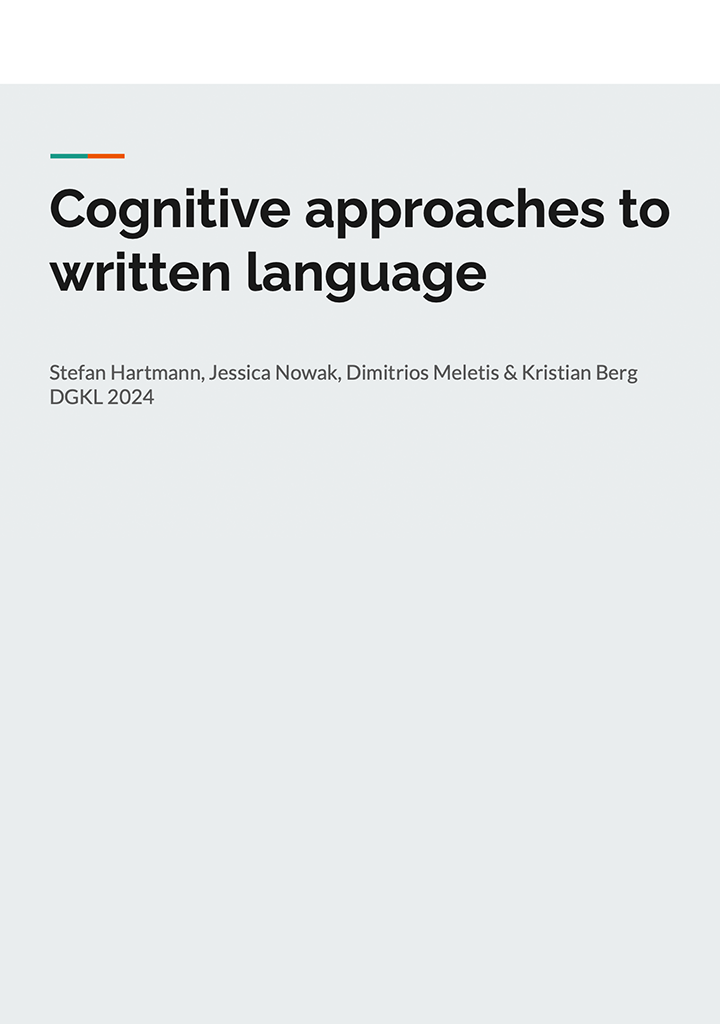
12/2021. Writing: System, use, ideology (Workshop at the 46th Austrian Linguistics Conference, December 9–10, 2021, University of Vienna [virtual], AT) [Description, Program, and Abstracts]
Featuring talks from: Florian Busch, Florian Coulmas, Peter T. Daniels, Zohar Eviatar, Amalia E. Gnanadesikan, Stefan Hartmann, Nadja Kerschhofer-Puhalo, Hye K. Pae, Jürgen Spitzmüller, Rebecca Treiman, Heather Winskel, and myself.
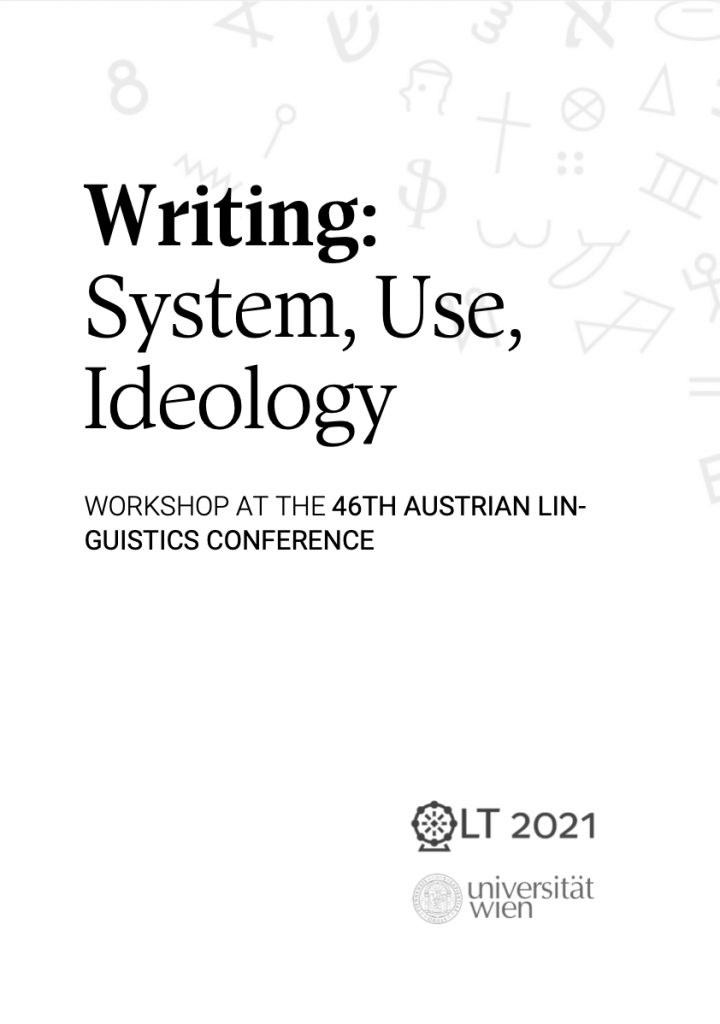
11/2016. Theorien und Methoden in der Schriftlinguistik (Workshop at the 42nd Austrian Linguistics Conference, November 18–19, 2016, University of Graz, AT) [Program] [Abstracts]
Featuring talks from: Dörte Borchers, Florian Busch, Stefanie Dipper, Christa Dürscheid, Konstanze Edtstadler, Agnes Kim, Birgit Mesch, Christina Noack, Simon Pickl, Nikolas Ruge, Anja Voeste, Sandra Waldenberger, and myself.
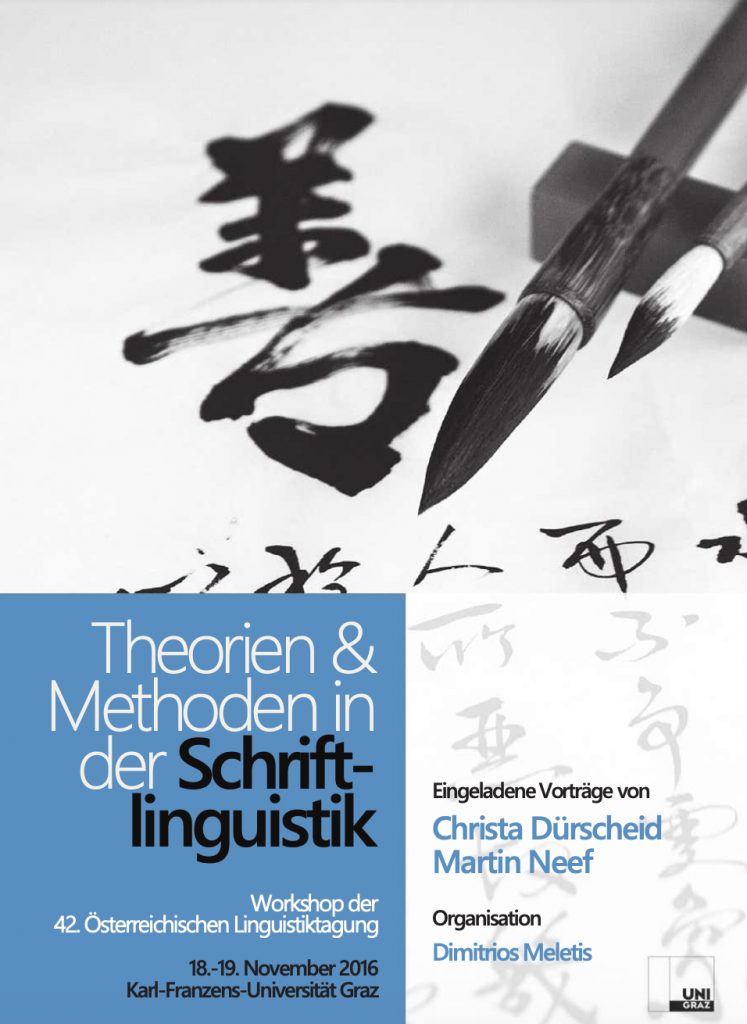
Talks
Click on the image to view/download the slides of a given talk (in PDF format).
11/2025 (invited). Attitudes and ideologies about writing systems (National Chung Cheng University, TW)
10/2025. “The worst writing system in history”: Public attitudes toward the learnability of writing systems (15th International Workshop of the Association of Written Language and Literacy, Italian National Research Council (CNR), Institute for Computational Linguistics “Antonio Zampolli”, IT) [Abstract]
06/2025 (invited keynote). Und was macht man damit? Karrierewege mit einem sprachbezogenen Studium (spraWIEN 2, Universität Wien, AT)
12/2024 (invited). Reflexion über Schrift und Schreiben (Metasprache und kommunikative Reflexivität: Wie wir über Sprache denken, sprechen und schreiben, Universität Bern, CH)
10/2024. Types of iconicity in phonographic writing systems (Grapholinguistics in the 21st Century 2024, Università Ca’ Foscari, IT) [Abstract]
Best Paper Award (3rd Place) voted on by the participants of the conference
09/2024. Every language gets the writing system its users can process: Exploring the relation between the linguistic and processing fits (10th International Conference of the German Cognitive Linguistics Association, Workshop ‘Cognitive approaches to written language’, University of Osnabrück, DE) [Abstract]
08/2024. Between dependency and autonomy: The relationship between speech and writing in early structuralist Schriftlinguistik and its impact on concepts of the study of writing (ICHoLS XVI, Session ‘Writing systems’, Tbilisi Ivane Javakhishvili State University, GE) [Abstract]
06/2024. Critical metaprescriptivism: An exploratory analysis of attitudes towards grassroots prescriptivism in a pertinent Facebook group (7th Prescriptivism Conference, Aix-Marseille University, FR) [Abstract]
05/2024 (invited). Grapholinguistics as an interdisciplinary framework for the synchronic and diachronic study of writing (Ancient languages and writing systems in contact, University of Rome ‘La Sapienza’, IT) [Abstract]
01/2024. The total grapholinguistic fact: Brief overview of past and present research (Department of Linguistics, University of Vienna, AT)
12/2023 (invited). Schriftlinguistik interdisziplinär, multiperspektivisch, komparativ – Strukturelle, psycholinguistische und soziolinguistische Aspekte (Universität Bonn, DE)
11/2023 (science-to-public). Der Mensch und seine Schriften: Visuelle Vielfalt zwischen Sprache, Natur und Kultur (Programm Junge Wissenschaft, Volkshochschule Wien, AT)
09/2023 (plenary talk with Jonas Romstadt). What is the graphem(at)ic status of punctuation units? Toward basic operational concepts of comparative punctuation research (Comparative Punctuation Worldwide, Universität Regensburg, DE) [Abstract]
09/2023. Writing de/scrib/ing itself: How the duality of writing as a metalinguistic instrument and research object challenges a Descriptive Grapholinguistics (Visiolinguistics: Panoramas of languaging and visuality, Open University, Milton Keynes, UK) [Abstract]
You can watch the recorded talk [here].
07/2023 (invited). Open questions in the cross-linguistic conception of the grapheme: Linguistic value, (supra)segmentality, and cognitive reality (SCRIPTA 2023, National University of Mongolia, Ulaanbaatar, MN) [Abstract]
07/2023 (with Karina Frick). “People incorrectly correcting other people”: (Re-)Correcting comments as a means of stance-taking in digital communication (18th International Pragmatics Conference; Panel ‘The speech action of commenting across discourse types’, Université Libre de Bruxelles, BE) [Abstract]
01/2023 (invited). Schriftlinguistische Grundlagen zum Zweitschrifterwerb (Phonologische & graphematische Grundlagen der Ausspracheschulung sowie des Schriftsprach- und Orthographieerwerbs in der Zweitsprache, PH Burgenland, Eisenstadt, AT)
10/2022 (invited keynote with Christa Dürscheid). Grapholinguistics: An expanding research field (LautSchriftSprache/ScriptandSound 5, University of Agder, Fevik, NO) [Abstract]
03/2022 (invited). How visual stereotypes work: The structure and sociosemiotics of cultural typographic mimicry (Multilingual Writing, Universität Bern, CH)
12/2021. Structural, psycholinguistic, and sociolinguistic typologies of writing (46. Österreichische Linguistiktagung, Workshop ‘Writing: System, Use, Ideology’, Universität Wien, AT) [Abstract]
09/2021. Literacy and self-prescriptivism: A metapragmatic discourse analysis of attitudes towards orthographic regulation (6th Prescriptivism Conference, Universidade de Vigo, ES) [Abstract]
07/2021. Grapholinguistic wars: How three arguments reflect an emerging discipline’s core questions (LACUS Forum 47, University of Toledo, US) [Abstract]
Presidents’ Prize for an Outstanding Paper given by a Jr. Scholar awarded by the Linguistic Association of Canada and the United States
03/2020 (with Terry Joyce). The ‘evolution’ of writing systems in terms of typological and other criteria: Crosslinguistic observations from the German and Japanese writing systems (42. DGfS-Jahrestagung, Workshop ‘The Evolution of Writing Systems: Empirical and Cross-linguistic Approaches’, Universität Hamburg, DE) [Abstract]
01/2020. Die neue Schriftlinguistik? Von reiner Deskription zur erklärenden Schrifttheorie (Linguistisches Kolloquium, Karl-Franzens-Universität Graz, AT)
12/2019. Warum sind Schriftsysteme wie sie sind? Natürliche Schriftlinguistik als erklärende Schrifttheorie (45. Österreichische Linguistiktagung, Universität Salzburg, AT) [Abstract]
10/2019. Schrift/Linguistik – Eine Theorie zwischen interdisziplinärer Schriftforschung und deskriptiver Linguistik (Deutsches Seminar, Universität Zürich, CH)
07/2019. Comparing the incomparable: Introducing Natural Graphematics and categories for the comparison of diverse writing systems (LACUS Forum 46, University of Waterloo, CA) [Abstract]
Presidents’ Prize for an Outstanding Paper given by a Jr. Scholar awarded by the Linguistic Association of Canada and the United States
06/2019. The pragmatics of orthographic shaming: Written speech acts and the negotiation of power, normativity, and discussion culture (16th International Pragmatics Conference, Hong Kong Polytechnic University, HK) [Abstract]
03/2019. How we model writing – The relationship between language, speech, and writing (12th International Workshop of the Association of Written Language and Literacy, University of Cambridge, UK) [Abstract]
05/2018. Schrifttheorie und Schriftpraxis: vom Graphem zu orthographic shaming (Linguistisches Kolloquium, Karl-Franzens-Universität Graz, AT)
12/2017. „Schreib, wie es vorgegeben ist“ – Das Konzept Orthographie in den Schriftsystemen der Welt (43. Österreichische Linguistiktagung, Alpen-Adria-Universität Klagenfurt, AT) [Abstract]
08/2017. What is a grapheme? Do we need it? Re-evaluating one of grapholinguistics’ core notions (11th International Workshop of the Association of Written Language and Literacy, Nanzan University, Nagoya, JP) [Abstract]
08/2017. Universality and diversity in writing systems: what can a universal model of writing systems achieve? (LACUS Forum 44, McMaster University, Hamilton, CA) [Abstract]
Presidents’ Pre-Doctoral Commendation Prize for an Outstanding Paper given by a Jr. Scholar awarded by the Linguistic Association of Canada and the United States
06/2017 (invited). Warum hassen alle Comic Sans? Wie die Materialität von Schrift ihre Verwendung einschränkt (Symposium Register des digitalen Schreibens, Universität Hamburg, DE) [Abstract]
11/2016. Kategorien einer visuellen Typologie von Schriften (42. Österreichische Linguistiktagung, Workshop ‘Theorien und Methoden der Schriftlinguistik’, Karl-Franzens-Universität Graz, AT) [Abstract]
09/2016. Zur Materialität von Schrift: Zentrale Fragen der Graphetik (Deutsches Seminar, Universität Zürich, CH)
06/2016. „Every language gets the writing system it deserves“: Probleme der Schrifttypologie (Linguistisches Kolloquium, Karl-Franzens-Universität Graz, AT)
05/2016. Naturalness of scripts and writing systems: Prolegomena to a Natural Grapholinguistics (10th International Workshop of the Association of Written Language and Literacy, Radboud University Nijmegen, NL) [Abstract]
04/2016. Sein oder des Nichtseins: Die Semantik des Genitivs der Negation (Junge Slavistik im Dialog XI, Christian-Albrechts-Universität zu Kiel, DE) [Abstract]
Posters
03/2023. Schriftlinguistik und Orthographie im Kontext struktureller, psycholinguistischer und soziolinguistischer Typologien (59. Jahrestagung des Leibniz-Instituts für Deutsche Sprache: Orthographie in Wissenschaft und Gesellschaft, Leibniz-Institut für Deutsche Sprache, Mannheim, DE) [Abstract]
04/2021. Types of allography: Conceptualizing structural variation in writing at the material and linguistic levels (7th Young Linguists’ Meeting in Poznan: Rethinking language and identity in the multilingual world, Adam Mickiewicz University, PL; held online due to Covid-19) [Abstract]
09/2018. (Re)Introducing graphetics. The materiality of writing, its questions, and its problems (Workshop Writing conventions and pragmatic perspectives, Université Libre de Bruxelles, BE) [Abstract]
06/2017. Die Natürlichkeit von Schriften und Schriftsystemen: Entwurf einer Natürlichen Schriftlinguistik (Stipendienverleihung, Österreichische Akademie der Wissenschaften, AT)
Teaching
Writing systems, literate cultures, and linguistic normativity (University of Graz, University of Vienna), taught 2025/26
This lecture with exercise investigates the interplay between literacy and linguistic normativity, with a focus on how writing systems give rise to, reflect, and enforce linguistic norms. Through the lens of structural graphematics, we examine typological differences between writing systems and how their internal organization impacts orthographic conventions. In addition to structural perspectives, the course incorporates sociolinguistic and pragmatic insights into how normativity manifests in everyday literacy practices, language ideologies, and discourse. Special attention is given to orthographic relativity—the idea that writing systems shape how we conceptualize and evaluate language—and to methodological approaches for analyzing metalinguistic and metapragmatic attitudes. Through theoretical readings, case studies, and discourse analyses, students will critically engage with the concept of orthographic relativity and the ways in which literacy practices mediate perceptions of language correctness, authority, and identity. This course complements the module’s focus on phonetics, phonology, and writing by exploring writing as a linguistic modality in its own right and its broader cultural and normative implications.
Writing Systems (2023 LSA Summer Institute, University of Massachusetts Amherst), taught 2023
Writing Systems and Their Use (2025 LSA Summer Institute, University of Oregon), taught 2025


I was honored to teach a course on writing systems twice at the prestigious LSA Linguistic Summer Institute: first in 2023 at the University of Massachusetts Amherst and again in 2025 at the University of Oregon, where it was offered under the revised title Writing systems and their use. Both iterations explored how writing systems relate graphic marks with the structures of specific languages and highlighted the need to complement structural perspectives on writing with use-oriented ones. Examining writing as a tool of everyday communication deeply embedded in culture, the course covered a wide range of topics, including the relationship between the spoken, signed, and written modalities of language, the structural description and typology of the world’s writing systems, the psycholinguistics of reading and writing, the instruction and acquisition of literacy, and the sociolinguistics of writing and orthography. While the 2023 course was closely aligned with the Institute’s theme Linguistics as a cognitive science: Universality and variation, the 2025 workshop broadened its focus and more explicitly integrated structural, systematic, and use-oriented perspectives on writing systems, in line with the Institute’s theme Language in Use.
Internet communication (with Christa Dürscheid, University of Zurich), taught 2021
In this course, which I taught together with Christa Dürscheid, we address communication on the internet in general and look at different media, their features, and practices in which users engage when using them: email and text chat, Twitter, Instagram, TikTok, Clubhouse, and Greenroom, to mention some. In this context, we also introduce methods of studying digital data in linguistics. Furthermore, specific timely topics of digital communication are treated such as communication with roboters and language assistants, memes, grammar nazis, shitstorms and cancel culture, as well as fake news and fact-checking.
Introduction to synchronic linguistics (University of Zurich), taught in 2020, 2021
In this introductory course, after explaining what linguistics is (and what it is not), I am teaching students the basics of phonetics, phonology, morphology, syntax, and—because it’s me who is teaching it, after all—grapholinguistics, especially graphematics and orthography. The focus is on German, but I also give many examples from other languages.
The German writing system from a contrastive perspective (University of Zurich), taught 2020
Perspectives of grapholinguistics (University of Graz), taught 2017
In these seminars, I give an overview over the core topics of grapholinguistics. I introduce them focusing on the German writing system, which also serves as a basis for comparisons with other systems. The topics covered are the relationship of writing to speech and language, graphetics, graphematics, orthography, typology (phonography, morphography), the psycholinguistics of reading and writing, literacy acquisition and instruction, and the sociolinguistics of writing.
Grammatical theory and typology: Negation (University of Graz), taught 2019/20
In this seminar, I cover several different facets of negation: standard negation (in declarative sentences), negation in imperatives and existential sentences, negative concord and double negation, the acquisition and processing of negation, and the pragmatics of negation.
Biography
If you’re interested in and ready for a lot more (prose) detail, click here.
The Beginnings
For the first years of my life (i.e., prior to my parents’ divorce), I was raised bilingually (German/Greek), and the elementary school I then attended was one of the first bilingual ones in Austria (German/English). It is no big surprise, then, that I fell in love with all things language, so much so that it was almost a given that I would later choose to study linguistics at the University of Graz (AT). Although I was instantly hooked on the general study of language(s), I also wanted to delve deeply into a new language, which is how I wound up studying Russian (from scratch). In 2013, I completed my two bachelor’s studies with a thesis on the psycholinguistic relevance of the comma in the reading process[1] and a cultural-analytical thesis on the Russian remake (or rather copy) of the popular US sitcom How I Met Your Mother.[2] Given that I wanted to pursue an academic career, I continued with respective master’s studies, obtaining MA degrees in linguistics (in 2014) with a thesis on psycholinguistic issues relevant in graphetics, the study of the materiality of writing,[3] and in Russian (in 2016) with a study of the semantics (and, to a lesser degree, syntax) of the Russian genitive of negation.[4]
[1] The thesis reported on an experiment in which I compared reading durations of correctly punctuated sentences and sentences lacking commas before syntactic parentheses. In many cases (especially when the removal of a comma resulted in a transitive verb being directly adjacent to a possible object), the absence of commas led to interesting garden path effects.
[2] The bottom line was that the Russian remake, whose title Kak ja vstretil vašu mamu is a literal translation of How I Met Your Mother, was an almost completely faithful copy of the original (which is actually common practice for Russian TV remakes), with the exception of a few culturally significant changes—such as turning a gay character straight. This thesis was fun to write not only because the topic of cultural remakes is fascinating but also because I am very interested in television (and television studies), particularly TV criticism and the reception of TV (BTW, my favorite TV series is the trailblazing Golden Girls, I even have an original autograph from Betty White).
[3] In 2015, after publisher Werner Hülsbusch contacted me, I decided to publish a modified version of the thesis. That was definitely the right decision—I was extremely delighted to receive (personal) positive reactions from, among others, Hartmut Günther, who had been instrumental in founding graphetics as a linguistic subfield and an idol of mine. The book was also reviewed by Andi Gredig [here] and is now openly accessible in the University of Graz’ repository [here].
[4] The thesis was also published (in 2017) in the book series Grazer Studien zur Slawistik after the series editor and then-head of the University of Graz’ Slavic Studies department had personally invited me to publish it there. It is titled Sein oder des Nichtseins – Die Semantik des Genitivs der Negation im Russischen. Notably, German ‘Nichtsein’ (a rather seldom- to never-used noun for ‘not to be’) appears (ungrammatically) in the genitive, reflecting an attempt at linguist humor. The topic of negation fascinated (and still fascinates) me so much that I later taught a course on negation.
The PhD years
In October 2015, I started working as a predoc assistant at the Department of Linguistics at the University of Graz and from that point on, my research gained pace: my thesis on graphetics was published as a book and I was given the chance to write the overview article on graphetics as well as over thirty smaller entries for an encyclopedia titled Grapholinguistics (as a part of the De Gruyter series Dictionaries of Linguistics and Communication Science).[5] In 2016, I attended my first Association for Written Language and Literacy (AWLL) workshop (in Nijmegen, NL) where I presented the concept of my PhD thesis: My interest in both theory construction and what I often call the ‘bigger picture’ had prompted my decision to analyze typologically diverse writing systems to carve out core and hitherto underdeveloped concepts—such as the controversial grapheme—in the (structural) analysis of writing and thereby establish a foundation for a comparative grapholinguistics. I would then embed this descriptive theory in a functionalist framework that incorporates usage-based psycholinguistic and sociolinguistic approaches as well as extralinguistic data. The talk went well… and I’ve been to each AWLL workshop since.[6] Later in 2016, I organized a (multinational) workshop on grapholinguistic theory and methodology at the 42nd Austrian Linguistics Conference[7]. I also received my first-ever invitation as a speaker—for a talk at a symposium dedicated to the registers of digital writing at the University of Hamburg (DE) in June 2017, where I gave a talk on metapragmatic discourses (specifically: the fervent online dislike) surrounding the infamous typeface Comic Sans,[8] which also sowed the seeds for my postdoc project on the relation between literacy and normativity (see below). Also in 2017, I was awarded a fellowship by the Austrian Academy of Sciences to complete my PhD. Other noteworthy highlights include three talks in 2017, 2019, and 2021 at the open-minded and stimulating conferences of the Linguistic Association of Canada and the United States (LACUS) in Canada (or online, in the case of the 2021 conference); this conference series is special to me not only because significant grapholinguistic presentations have been given at LACUS in the past[9] but also because I won prizes for all three of my talks there.[10] Finally, I embraced the opportunity to present a pragmatic project I had started working on (and which feeds directly into my current postdoctoral project, see below), focusing on a practice that I call orthographic shaming (i.e., pejoratively correcting others’ spelling mistakes publicly on the internet, mostly in social media) as well as general attitudes on orthography[11] at the Sociolinguistics Symposium[12] in Auckland (NZ) in 2018, at the International Pragmatics Conference in Hong Kong in 2019, and at the Prescriptivism Conference in Vigo (ES, online due to Covid-19) in 2021.
[5] The overview article can be found [here] (unfortunately, it is not openly accessible) or downloaded as a PDF [here]. Work on the encyclopedia was currently wrapped up after over 10 years. Aside from the online version, it will be published in print (likely in late 2024). Also, as a side note: For the entries Graphetik, Kineto-Graphetik, and Phano-Graphetik, I was given an award for an excellent peer-reviewed publication based on a master’s thesis by the Faculty of Arts and Humanities of the University of Graz, cf. [here].
[6] The Nijmegen workshop was the 10th workshop in the AWLL workshop series; my contribution was published as an article in a special issue of Written Language & Literacy and can be found [here]; you can download a pre-print version [here]. (I am grateful that Peter T. Daniels, whose research was one of the reasons I got into grapholinguistics in the first place, provided feedback on a draft of the paper.) At AWLL11, which was held in Nagoya (JP) in August 2017, I talked about the definition of the grapheme, and at AWLL12, which took place in Cambridge (UK) in March 2019, I discussed the relationship between speech and writing in models of writing. At AWLL13, which was virtually hosted by the University of North Carolina (US) in October 2021, my presentation focused on graphotactics. Finally, at AWLL14 hosted by Temple University Rome (IT) in November 2023 I talked about the relationship between literacy and linguistic normativity.
[7] Christa Dürscheid, author of the seminal Einführung in die Schriftlinguistik [‘Introduction to grapholinguistics’] was a keynote speaker; Martin Neef was also slated to give a keynote but, unfortunately, had to cancel. Other speakers included Anja Voeste and Christina Noack. The full workshop program can be viewed [here].
[8] In March 2020, a volume based on the symposium and edited by Jannis Androutsopoulos and Florian Busch was published by De Gruyter; it can be found [here].
[9] Relevant grapholinguistic presentations at LACUS include a programmatic talk by Peter T. Daniels in which he argues against a linguistic graphem(at)ics (1991), and a rebuttal by Earl M. Herrick (1994) as well as two more responses by Daniels and Herrick (both 1994). Also, David G. Lockwood (2001) contributed an interesting paper on the grapheme. An absolute highlight of mine was meeting people at the LACUS conferences who had actually been present in person when these important talks were given and who could even remember interesting details. In that vein, in July 2021, at the (virtual) LACUS Forum (hosted by the University of Toledo, Ohio), I gave a talk about grapholinguistic historiography and addressed, among others, the above-mentioned dispute between Daniels and Herrick (cf. also the following footnote).
[10] In 2017, in Hamilton (CA), I was the runner-up for a Presidents’ Prize for an Outstanding Paper given by a Jr. Scholar. Then, in 2019, in Waterloo (Ontario, CA), and again in 2021, when the conference was held virtually (hosted by the University of Toledo) due to the ongoing Covid-19 pandemic, I won first prize. The prize is decided on by past presidents of LACUS who attend the conference and is awarded to the best talk given by a junior scholar who has not yet completed his PhD or has not had his PhD for more than five years.
[11] In the course of this project, I collected examples of what I termed orthographic shaming [from comments on posts found on public pages on Facebook], i.e., what so-called spelling ‘nazis’ or grammar ‘nazis’ practice when they publicly (and often in a denigrating way) correct others’ spelling mistakes on the internet, mostly to discredit the person making the mistakes to deflect from the actual topic being discussed. I also conducted 21 semi-structured interviews with Austrian students aged 18–29 about their opinions on this practice as well as their general attitudes towards orthography, orthographic mistakes and people who make them, and orthography reforms. I talked in more detail about these interviews at the 6th Prescriptivism Conference hosted by the University of Vigo (ES). The interesting results of both the corpus analysis and the interviews (still unpublished but mentioned in The Nature of Writing, pp. 378–381) inspired me to pursue a sociopragmatic postdoc project. Cf. also [my entry ‘Grammatiknazi’] in the Diskursglossar.
[12] Here’s a happy GIF of me at the Sociolinguistics Symposium, where I received great feedback after my talk and met wonderful people. 
The early postdoc phase
In 2019, I completed my PhD (which was supervised by Bernhard Hurch, University of Graz, and Christa Dürscheid, University of Zurich) and starting in April 2020, I worked as a postdoc assistant at the University of Zurich (Department of German Studies). One of my main research interests continued to be the promotion and advancement of foundational grapholinguistic research and theory, and I have published work on basic but hitherto neglected concepts such as the grapheme,[13] allography,[14] and graphetics[15] (all open access) in the hope of shaping a more comparative grapholinguistics; articles on graphotactics and types of orthographic standardization are to follow. Also, in November 2020, a modified version of my dissertation was published as an open access monograph titled The Nature of Writing: A Theory of Grapholinguistics[16] in the new Grapholinguistics and Its Applications series[17] (published by Fluxus Editions). The Faculty of Arts and Humanities of the University of Graz awarded me a prize for it. In late 2020, I was invited to write a personal essay on the field of grapholinguistics and my own ‘journey’ in it for the proceedings of the conference Grapholinguistics in the 21st Century (June 2020, online). Although this was an intimidating task, it was also an exciting one—the resulting essay ‘On being a grapholinguist’ can be downloaded below.[18] Then, in early 2021, I was asked to write an accessible article (in German) about my PhD thesis for a magazine published by the University of Graz, and I must say I enjoyed writing for a broader, non-scientific audience a lot.[19] My next venture into science-to-public was a talk (in German) about core findings of my PhD thesis at the Scientifica in Zurich in September 2021; it can be watched [here]. My interdisciplinary and international workshop Writing: System, use, ideology was held as part of the 46th Austrian Linguistics Conference (hosted by the University of Vienna) in December 2021. The workshop description as well as the program and the abstracts can be downloaded [here].[20] A major recent project is the book that I wrote together with Christa Dürscheid; it is an overview of grapholinguistics titled Writing Systems and Their Use and was published as an open access-book in 2022 in the series Trends in Linguistics: Studies and Monographs at De Gruyter; you can download it [here]. Also together with Christa Dürscheid, I was invited to give a keynote at LautSchriftSprache (LSS) 5, which was held in Kristiansand/Fevik (NO) in October 2022. Furthermore, upon invitation, I recently wrote chapters on phonographic iconicity for the Oxford Handbook of Iconicity in Language and on the grapholinguistic perspective on graphic variation for the Bloomsbury Handbook of Global Typography. Finally, I taught a course on writing systems at the LSA Linguistic Institute at the University of Amherst Massachusetts in the summer of 2023.
[13] My article on the grapheme was published in Writing Systems Research and can be found [here]. I am ecstatic that it has become the second most-read paper of the journal. It also turned out that the volume in which my article was published (vol. 11) was the last one, as the journal was, unfortunately, ceased by Taylor & Francis.
[14] The paper in which I describe different types of allography at different (graphetic and graphematic) levels has been published in the OA journal Open Linguistics published by De Gruyter; it can be found [here].
[15] The monograph on graphetics as well as the encyclopedia article on it were published in German. In my first English publication on the topic, I give a definition of the field and an overview of its core concepts and ideas. It is an article that was accepted in 2020 (and was finally published in 2022 in the much-delayed 2020 issue) by Scripta—an OA journal focusing on writing systems, previously co-edited by Zev Handel and published by the Korean Hunmin jeongeum Society, which also organizes international and domestic (i.e., held in South Korea) conferences on grapholinguistics every year, cf. [here]. (I was invited to give a talk at the 2023 conference in Ulaanbaatar and also asked to become a co-editor of the journal!)
[16] The book can be downloaded below, but also at the official website [here]. Also, it can be purchased as a paperback book on Amazon [here] (this links to the German version of Amazon; it can also be bought at other regional versions of Amazon). Here is a picture of me being happy while holding it for the first time: 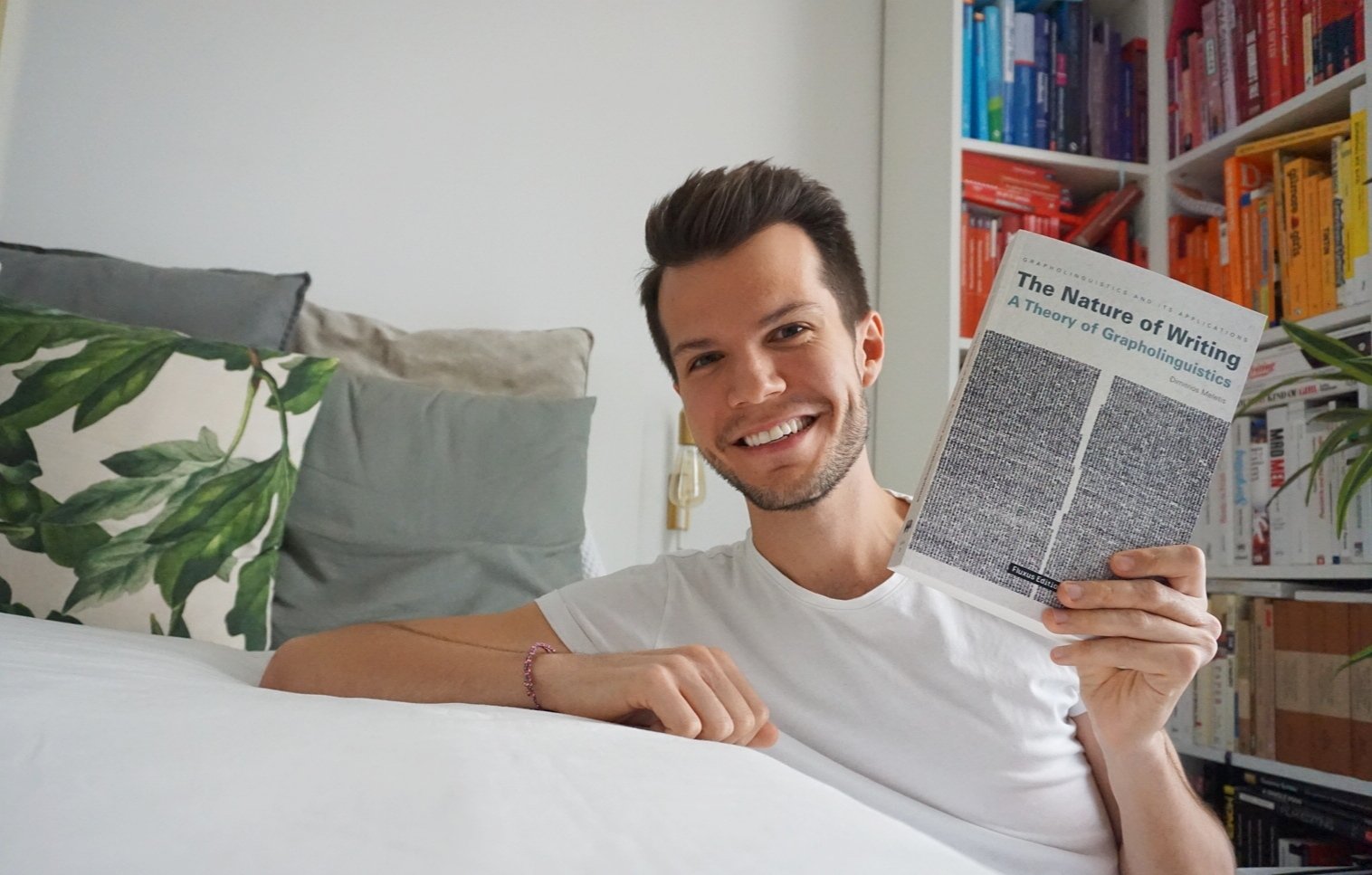
[17] The series can be found [here].
[18] The essay’s abstract reads: In this essay, I discuss the challenges of (engaging in) grapholinguistics, a young field that focuses on writing, a topic mostly marginalized in ‘mainstream’ linguistics to this day. Issues that are raised include the lack of writing-related classes in linguistic study programs, institutionalization (e.g. departments or chairs for grapholinguistics), and pertinent publication and presentation outlets. Furthermore, the essay highlights problems caused by the interdisciplinarity of grapholinguistics, including linguistic, theoretical, methodological, and terminological boundaries that must be crossed. These issues are partially addressed through a personal lens, i.e. my own ‘journey’ in the field thus far. This allows me to speak from (some) experience not only about the risks of focusing on a topic at the periphery of many disciplines and some of the setbacks this entails but also about my motivation behind proposing a (sketch of a) theory of writing in my PhD thesis that—based on linguistic Naturalness Theory—aims to offer a unified descriptive and explanatory framework for studying writing systems and writing in general. It also gives me a chance to argue that writing, which can be studied with many of the concepts firmly established in other fields of linguistics (as well as additional writing-specific concepts), is central to every language that is spoken, signed and written in literate language communities and should therefore be an integral rather than an optional part of linguistic theories and paradigms in general. Essentially, this essay highlights why doing research in grapholinguistics should be embraced rather than justified.
[19] The article is titled Warum ist Schrift so, wie sie ist? (‘Why is writing the way it is?’) and was published in the spring 2021 volume of Gewitter, a magazine published by the students’ representation of the humanities at the University of Graz. The article can be downloaded [here].
[20] The workshop’s speakers were Florian Busch, Florian Coulmas, Peter T. Daniels, Zohar Eviatar, Amalia E. Gnanadesikan, Stefan Hartmann, Nadja Kerschhofer-Puhalo, Hye K. Pae, Jürgen Spitzmüller, Rebecca Treiman, Heather Winskel, and yours truly.
The present and the future
My primary postdoc project is titled Orthographic relativity: Comparing the relation between literacy and linguistic normativity across writing systems and literate cultures.[21] It grew organically out of my previous metapragmatic/sociolinguistic research on discourses surrounding Comic Sans, orthographic shaming, and typographic mimicry, and is located at the interface between grapholinguistics, sociolinguistics, and pragmatics.[22] Its main question is how the structure of different writing systems (specifically German, Norwegian, and Japanese) as well as the specific sociolinguistic and sociopolitical embeddings and conditions of literacy in the respective literate communities influence not only categories and concepts of normativity and prescriptivism that users employ to evaluate writing and all language in general but also ideologies (both normative ideologies and ideologies on normativity). In brief: whether there is an orthographic relativity to (socio)linguistic normativity. After receiving a four-year fellowship by the Austrian Academy of Sciences for this project in 2023, I started working at the Department of Linguistics at the University of Vienna. Some of my smaller ongoing projects within the broad scope of grapholinguistics are articles on graphotactics, different types of orthographic standardization, and grapholinguistic historiography. Another current project that I’m working on is the Handbook of Germanic Writing Systems and Literacies that I am editing with Stefan Hartmann and Rebecca Treiman.
[21] The project I had originally planned was titled The written language bias in practice: A comparative sociolinguistic study of literacy’s effects on normative attitudes about language (which is a title that is still fitting for part of my new, broader project). I submitted a proposal for a grant (by the Austrian Academy of Sciences) which was favorably reviewed by two anonymous reviewers but wasn’t funded. However, after revising it, it did work on my second try in 2022/23!
[22] Another sociolinguistic/socio-semiotic project that I worked on is a chapter that Anja Voeste and Ursula Rautenberg invited me to write for their handbook on typography, which consists of overview chapters and shorter corresponding case studies. I wrote a case study on typographic mimicry (i.e., when a typeface in a script such as Roman script is made to visually resemble a foreign script such as Arabic script). It complements Jürgen Spitzmüller’s overview article on typography as a social practice. An extended version—in English—was also published as an open access article in Social Semiotics and can be found [here].
the conference locations
The personal
A personal fact about me that fits the academic lifestyle is that I love to travel. I am incredibly grateful that being employed at universities has allowed me to attend conferences in places that I had always wanted to visit.[23] I live and work in my favorite city: Vienna.[24] I’m fairly creative and often look for outlets for my creativity. In fact, my original plan had been to study screenwriting and directing at the Film Academy Vienna (at which Academy Award-winning director Michael Haneke has taught, among others); however, for financial reasons, I could not move to Vienna at the time and decided to study linguistics in Graz instead (and the rest is history, described in detail above). I still dabble in screenwriting (or other forms of creative writing, such as memoir writing) now and then,[25] but most of the time, I am actively consuming films and TV series—as in engaging in discussion and observing ongoing discourses. My theoretical interest in the materiality of writing stems from practice as I am fascinated by typography and calligraphy and engage in (amateur) design (of posters, booklets, and, obviously, powerpoint slides, see above). Also, ever since having attended a bookbinding workshop, I will occasionally be found binding my own notebooks—which is incredibly meditative. In 2019, I trained to become a writing consultant (specialized in academic writing) and have organized workshops and offered one-on-one consultations at the Writing Center of the University of Graz. It feels great to put the theoretical knowledge of (and practical experience with) academic writing to use by means of supporting people in the writing process. What more? I am sharing my life with my partner, who is a speech and language therapist (a coincidence—but a good fit for a linguist, right?), and two Russian Blue cats named Mila and Cookie[26]. (I am what some people would call a ‘cat person’. And proud of it.)[27] Finally, if you ever meet me at a conference, chances are I will be wearing a shirt with small animal print[28]—or at the very least my shirt’s color will match the color of my slides.
[23] My favorite travel destinations so far have been Toronto and Tokyo (the alliteration is incidental, but cool).
[24] Vienna has topped best quality of life-lists for years, cf. [here].
[25] I actually wrote (and starred in) two short films when I was 16 and 17 and participated in a film program for teenagers and young adults.
[26] Here is a photo of the two sisters (yes, I am absolutely that guy who has a photo of his cats on his academic website; and yes, I obviously like the colors gray and green): 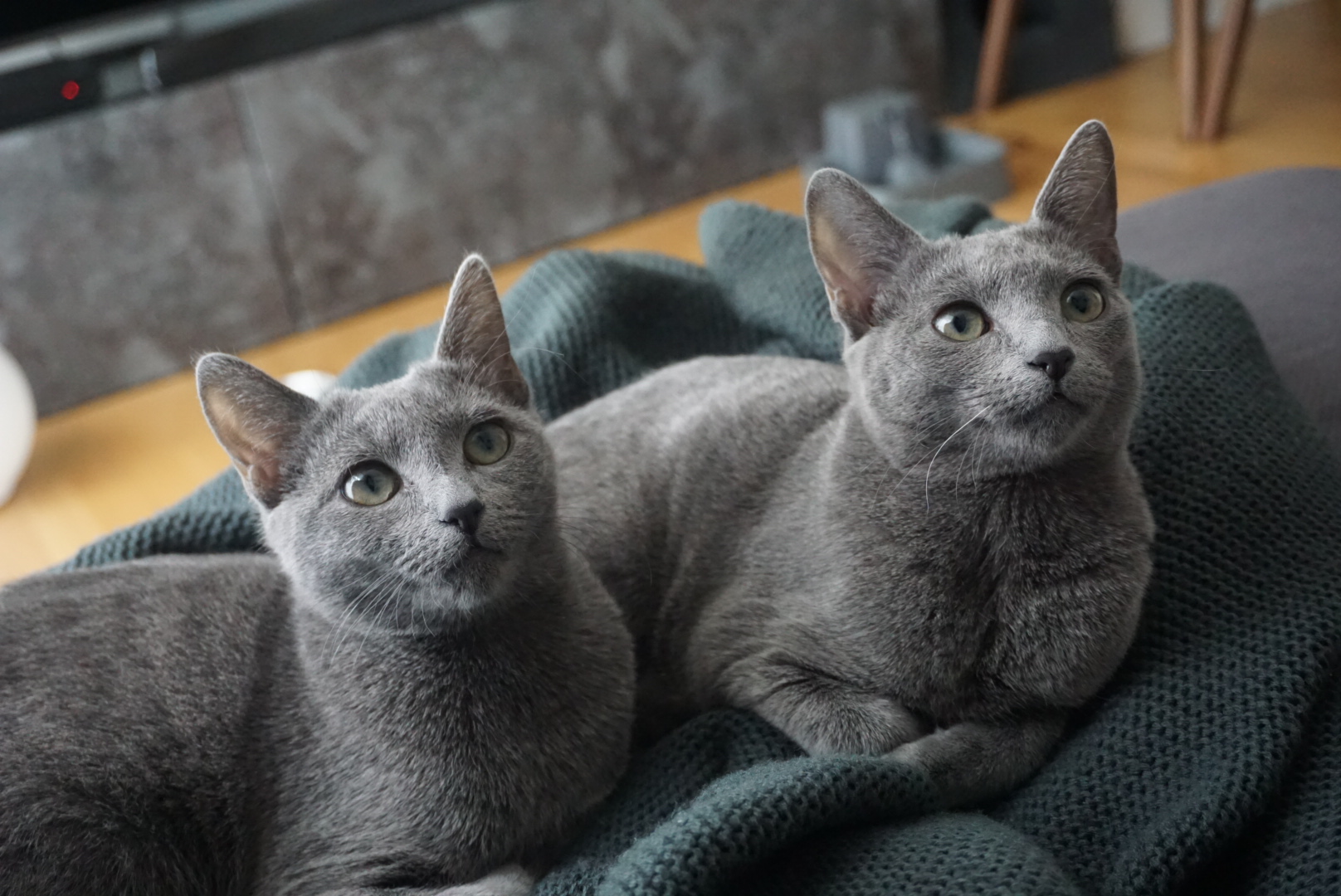
[27] I even thanked my cats in the acknowledgments of my dissertation: “Lastly, I want to thank my cats. (Yes, I am serious.) It is undeniable that at several stages of my writing process, they had to listen to most of my ramblings about graphemes, naturalness, etc. (and could not even complain to anyone about it). If certain studies are accurate, they have elongated my life by preventing cardiovascular diseases which are very likely a common side-effect of an academic lifestyle. Thank you for purring.” (And yes, I then cited a study on cardiovascular benefits of cats.)
[28] It will likely be a shirt with small foxes, penguins, birds, or—my favorite—raccoons.
Contact
If you have any questions, comments, or would like to collaborate, please contact me at

But please note that I am not reading or responding to emails outside of my usual working hours (Monday–Friday, 8am–5pm CET).
